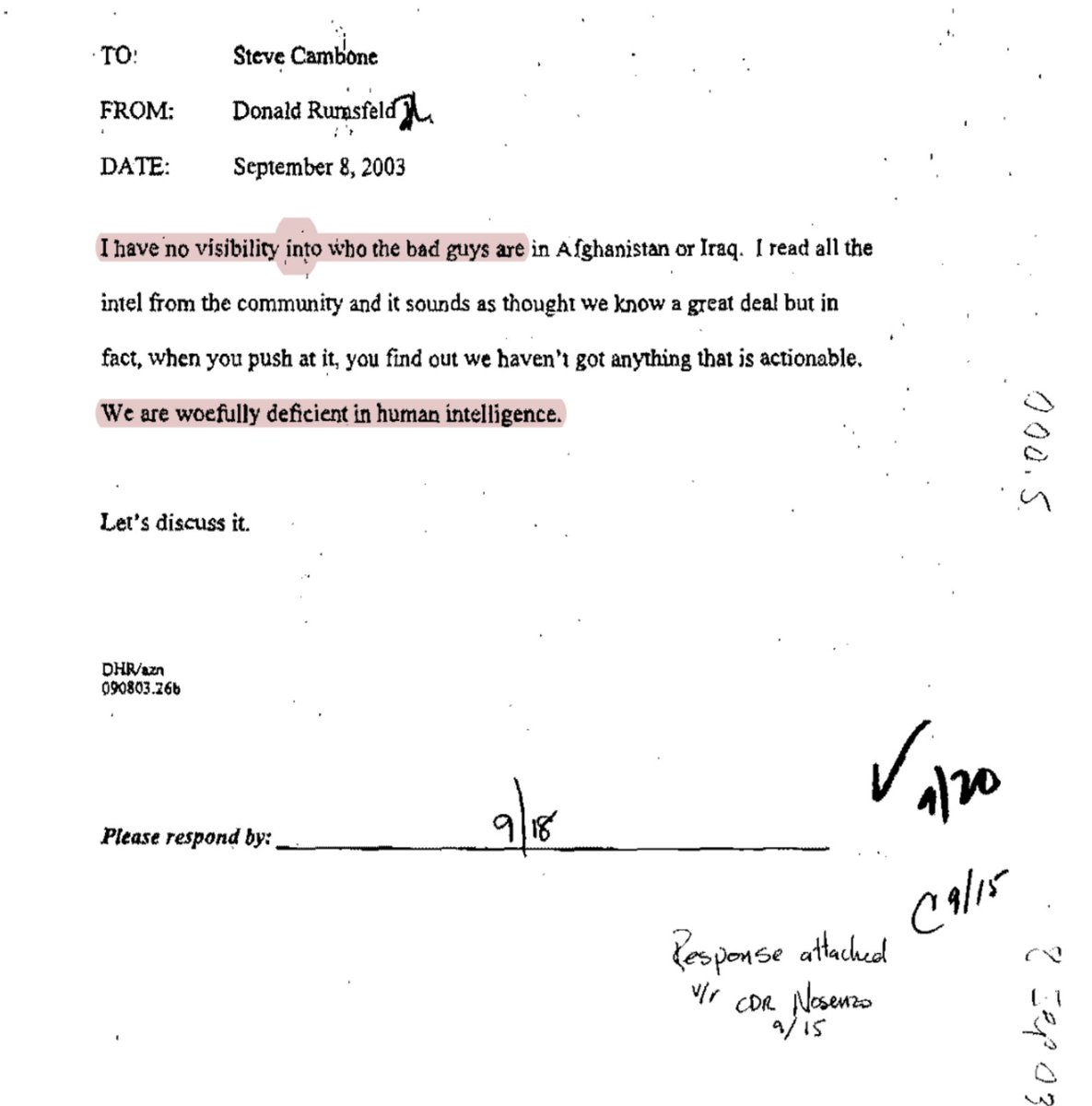I'm going to post some commentary here on the Afghan war documents from The Washington Post. 1/n
US military transported fuel by helicopter(!), delivers pizza and ice cream instead of eating local food. 2/n washingtonpost.com/graphics/2019/… 

Jeffrey Eggers blames "evolution" for US not questioning basic assumptions in Iraq. But states don't always fight endless wars for reasons leaders can't even articulate, a uniquely American problem. Due mostly to failures of leadership, pus bureaucracy and public choice. 3/n 

Michael Flynn: "There is a machinery that is behind what we do, and it keeps us participating in the conflict because It generates wealth." More precisely, it transfers wealth from the taxpayer to others, destroying wealth in the aggregate. 4/n 
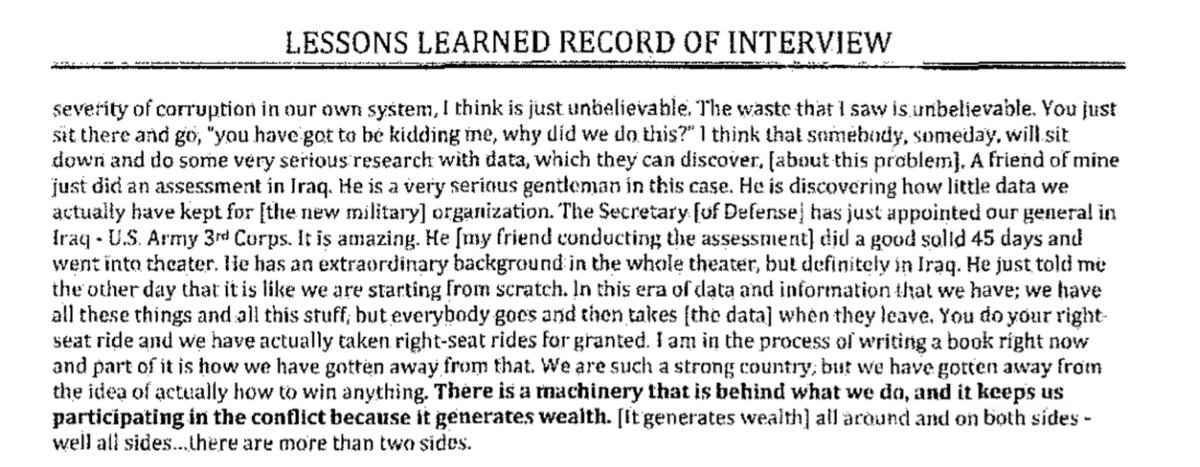
Instead of listening to local people about where to put wells, the US would put a well in between two tribes so that they would be forced to work together. Sounds like an 80s sitcom plot where the parents scheme to get siblings to appreciate one another. From Michael Flynn. 5/n 

Michael Flynn says we might be tapping Karzai's phone, then the next sentence is blacked out. If that's what got through, what could be in the next line? 6/n 
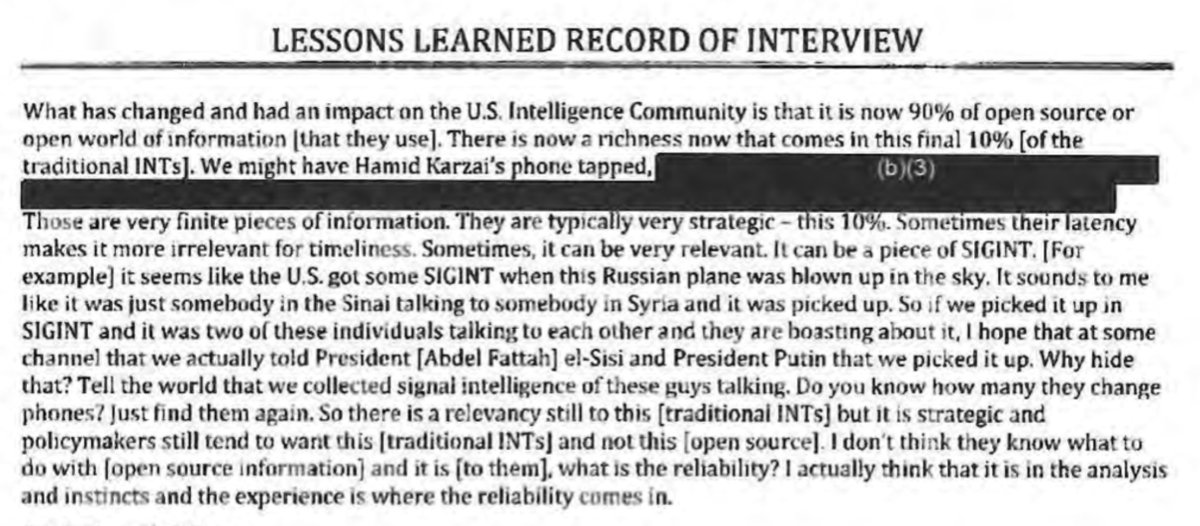
According to Flynn, one of the richest men in Afghanistan started out as an interpreter for the US, selling them things for a 100x markup. 7/n 
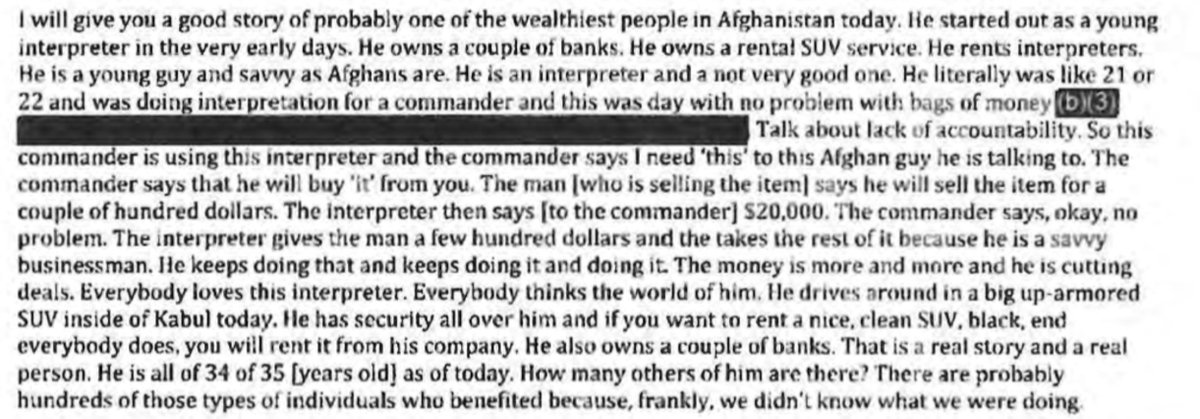
Flynn refers to "very sensitive" secret documents on how terrible things are going. Apparently, the censors will not even let us know what they're called, as that part is blacked out. 9/n 

Ambassador Douglas Lute says we spent $1 million per soldier to get them Burger King and bottled water. They couldn't even spend the money fast enough during the Petraeus surge. Every soldier who served in Afghanistan could be a multimillionaire for the cost of this war. 10/n 

According Colonel Bob Crowley, the Counterinsurgency Advise and Assist Teams were only open to hearing bad news when it was "small," like "we're running over kids." I assume the Colonel is not downplaying that himself but giving insights into attitudes. 11/n 

Ambassador Crocker was sent to Afghanistan to be the top US representative there, on 72 hour notice, without any knowledge of the region. 13/n 
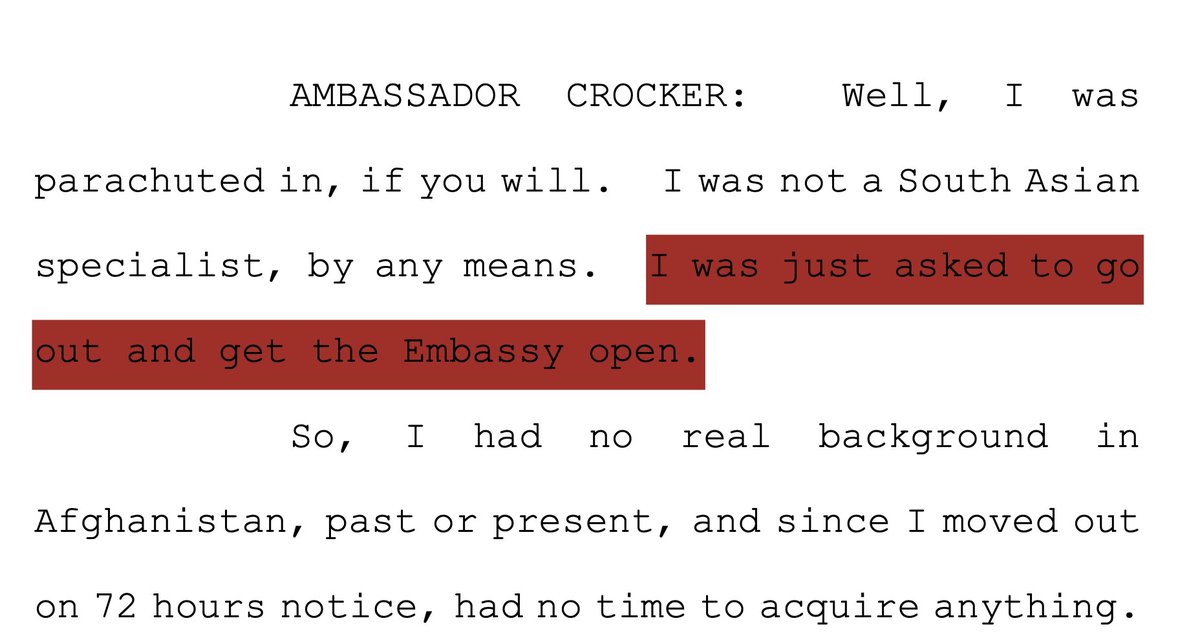
Upon being sent to Afghanistan, Ambassador Crocker could not make plans because the Bush administration still had not decided on what it wanted to do. Everything from "long term nation building" to keeping "our role and our agenda very minimal" was on the table. 14/n 
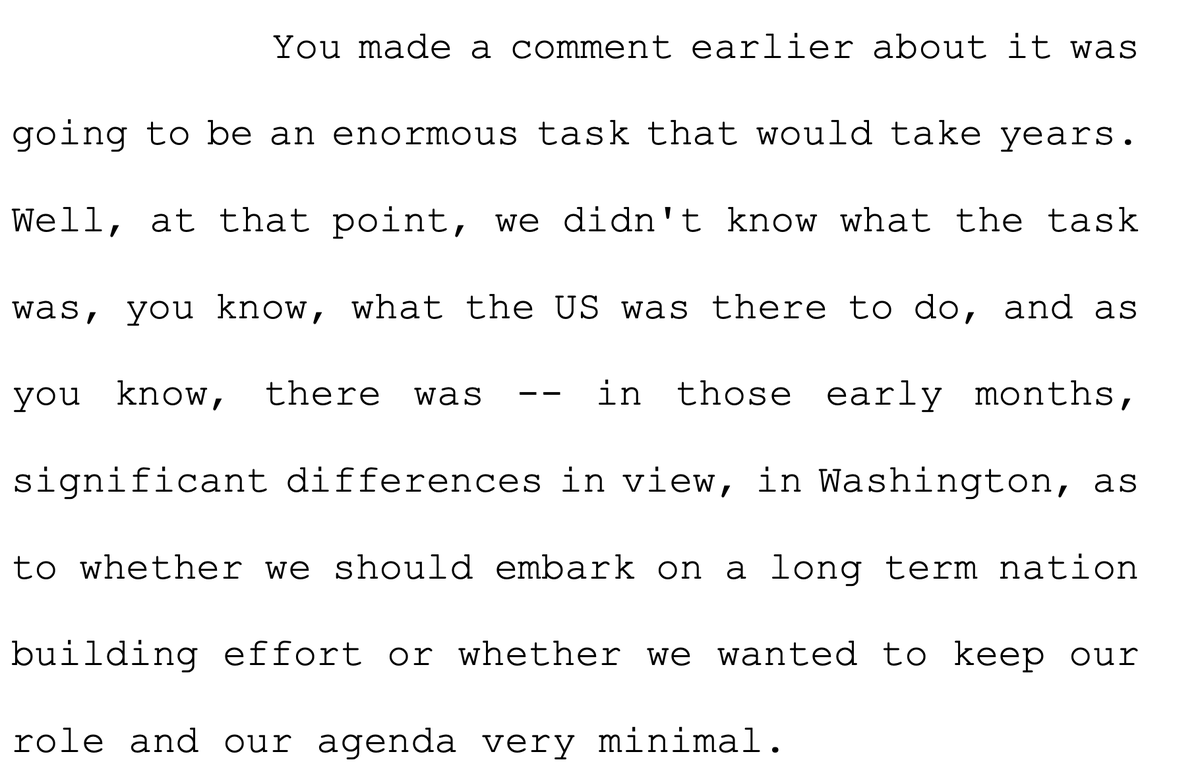
Ambassador Crocker says that nation building was necessary because the US couldn't justify minimal involvement due to the suffering of the Afghan people. Has that prevented more limited involvement in any of the dozens of other countries we attack? 15/n 

Northern Alliance commander, a US ally, giggled about a mob killing the civil aviation minister. Karzai was powerless to rein him in. 16/n 



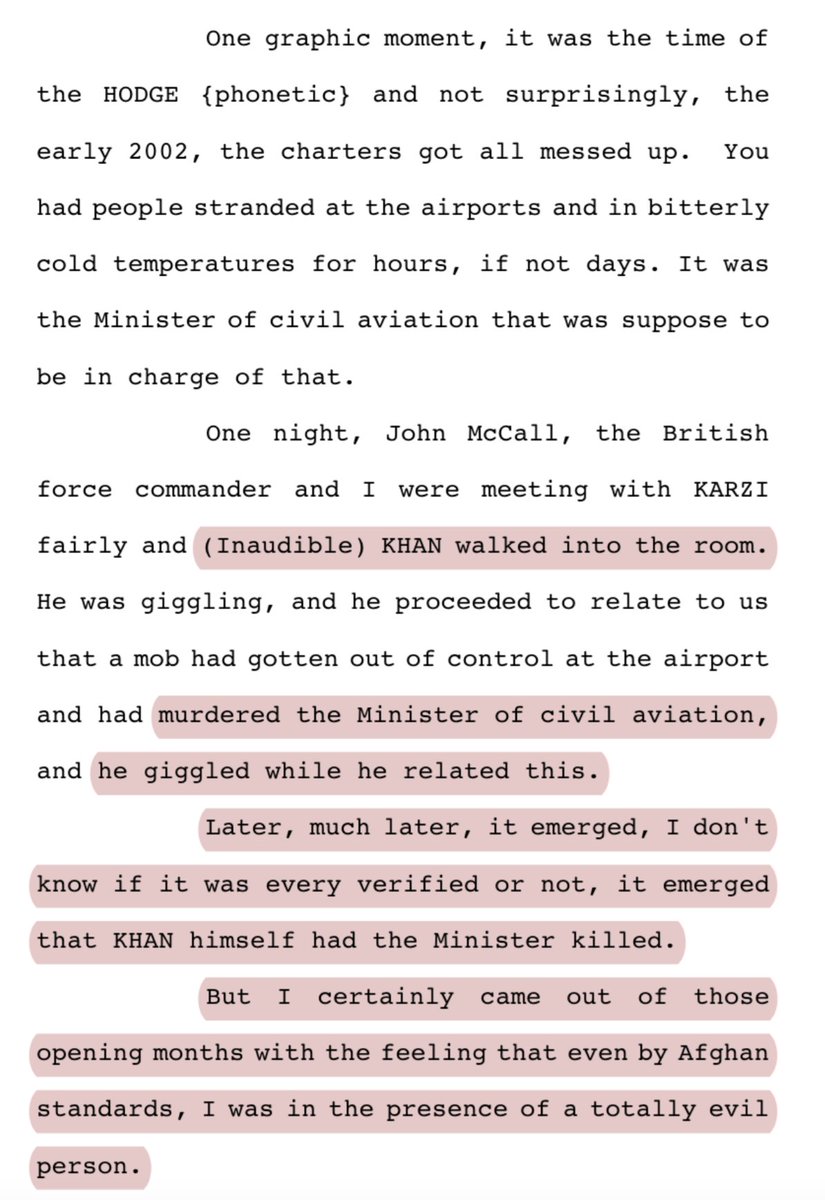

Ambassador Crocker blames corruption in the end for losing the war. Easy to say that, but fighting corruption would have meant taking on the government that we were supposedly allied with. This is simply a refusal to accept that the mission was impossible. 17/n 

Ambassador Crocker hopes this will all be useful for future nation building missions. I certainly hope not! Notice how it's assumed there will be more of these experiences, like it's a natural disaster. 18/n 

US decided to encourage crops where Afghanistan had a comparative advantage, and decided on pomegranates. To get them out of the country, they had to bribe the Ministry of Transportation, whose employees were not getting their salaries. washingtonpost.com/graphics/2019/… 19/n 

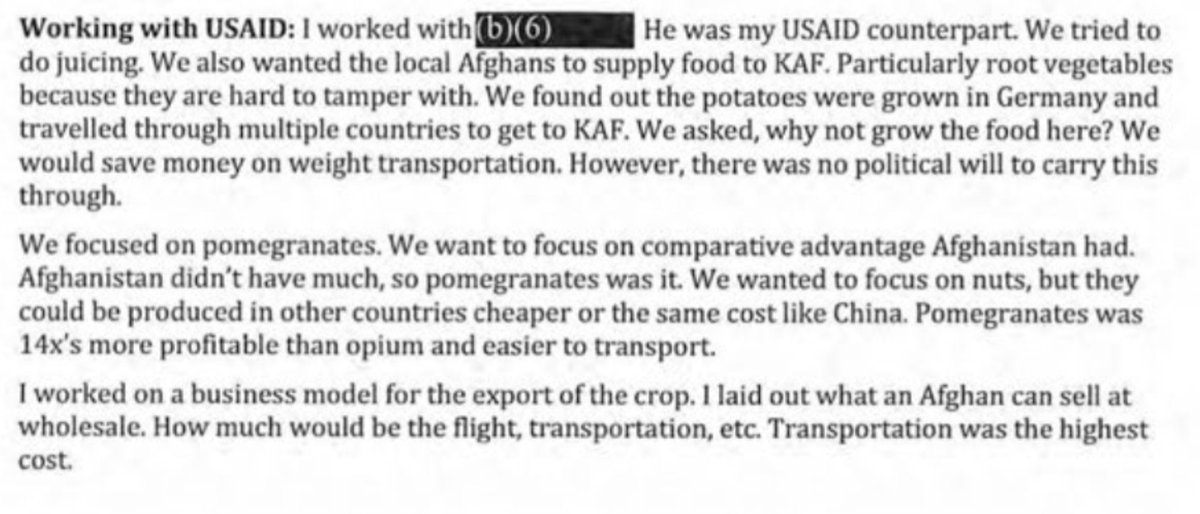

Sarah Chayes agrees with Crocker that corruption drives violence. This is basically saying hearts and minds should've been done better. Corruption was benefitting our "allies," Karzai's relationship with the US was bad enough as is. Simple solution, likely wrong. 21/n 

Chayes implies we should not have allied with warlords and Northern Alliance. Only alternative is Iraq strategy, burn every institution to the ground and hope you can create something from scratch. Didn't work there, I hope this is not the lesson policymakers draw. 22/n 
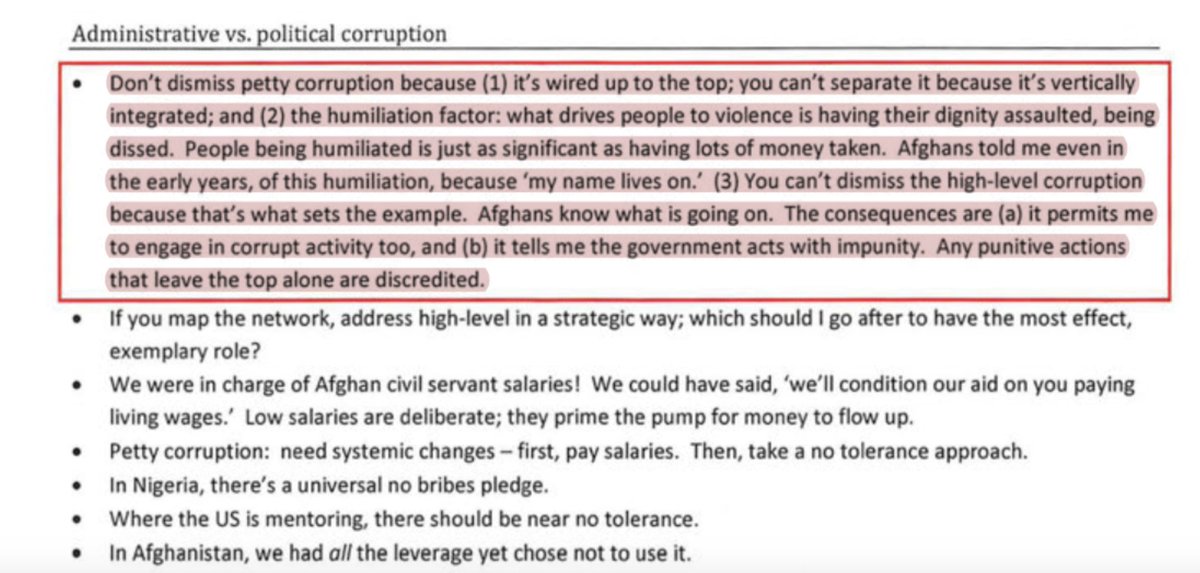
General Allen blames Afghan govt & entrepeneurs for not wanting to go where they would get killed. All we needed was a class of warrior-bueaurcrats/businessmen, and it could've worked! Why would any ambitious person do that when they could stay in Kabul and steal from the US?23/n 

US would try to tackle corruption, Karzai wouldn't allow it. For those who think tackling corruption is all you need to do, what should the response be? Other documents show that even Karzai's power was limited here, he needed support from other powerful people. 24/n 

David Petraeus said he warned this would be difficult, blames Obama for not giving him enough time. He could've said so at the time. Petraeus put himself in the position where he'd be a hero if it succeeded, but could otherwise blame others. He's always been good at PR. 25/n 


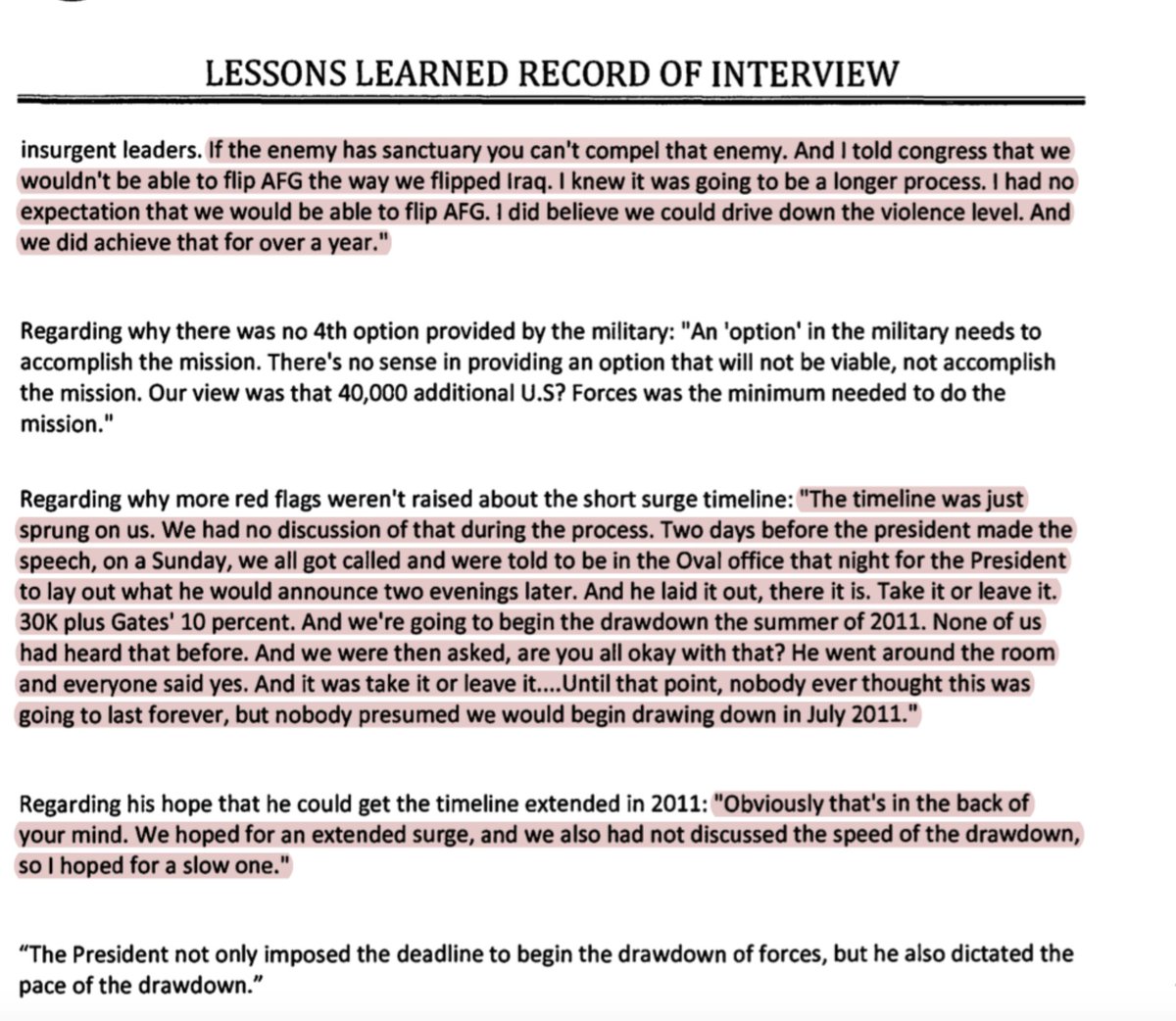
Policy is that the US keeps every single car, truck, and tank running 24/7 while in Afghanistan. 26/n 


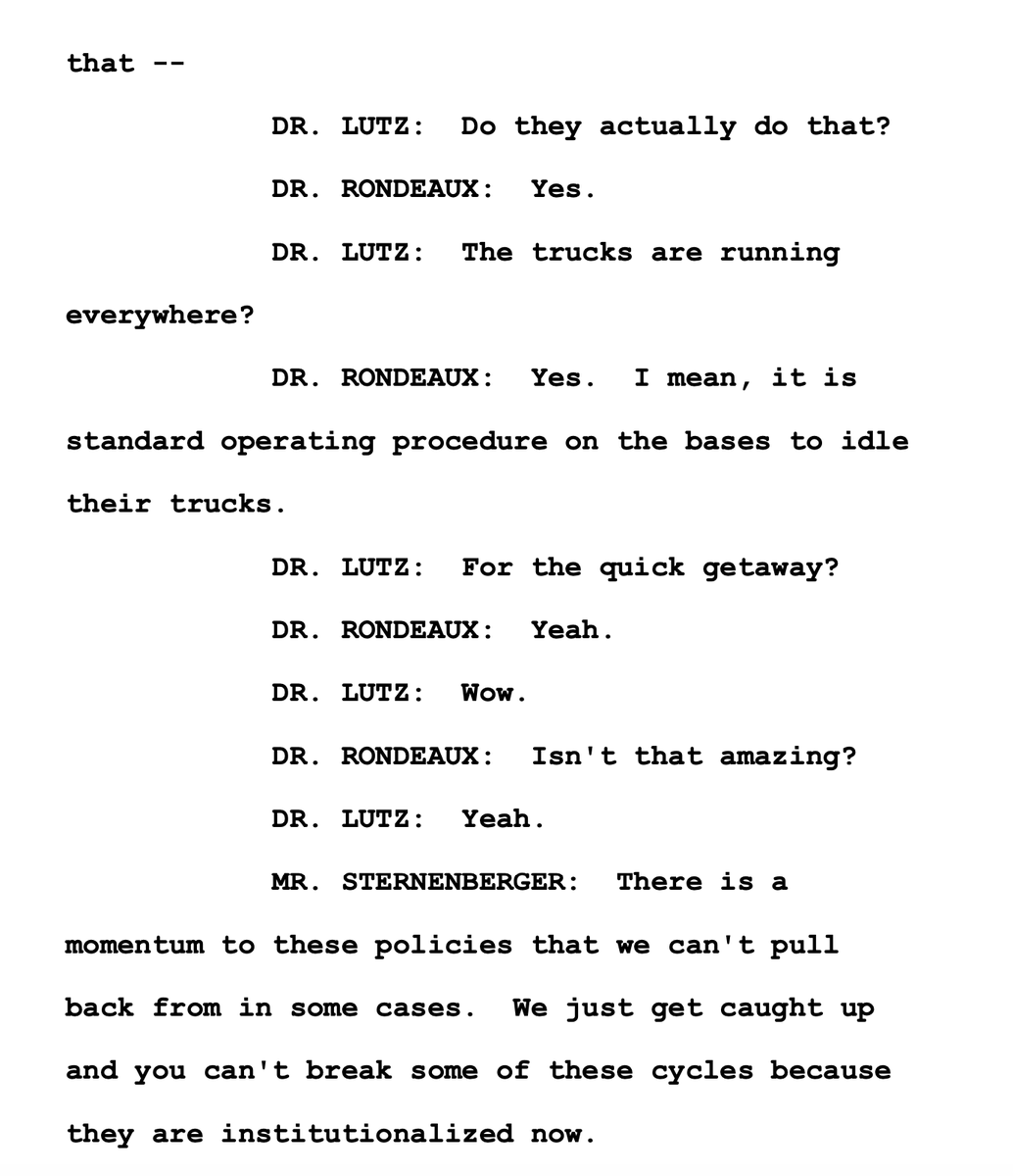
War lords were paid to provide security, so they would attack American soldiers and create a need to spend more on security. 27/n 

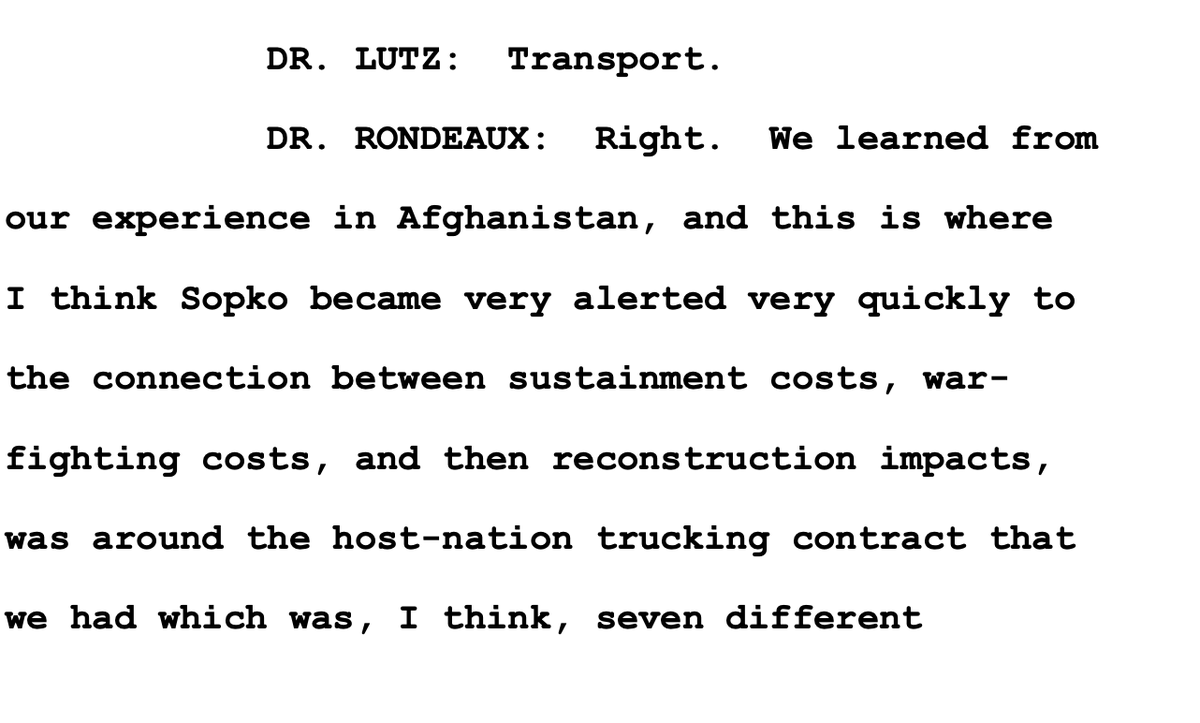
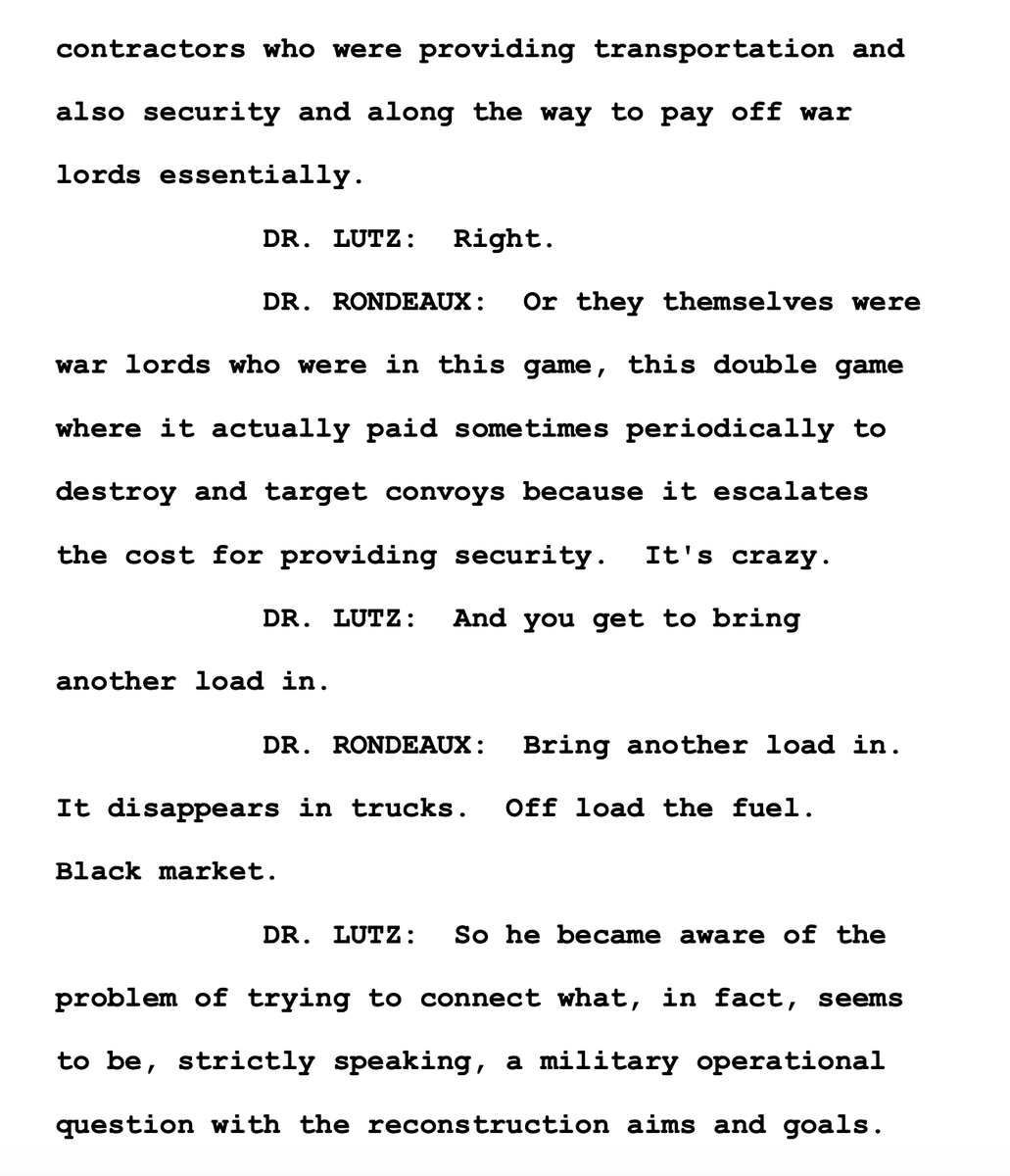
Professor Candace Rondeaux says Pakistani generals are getting rich off the war, starts to say something about "West Point graduates," and then asks to go off the record. 28/n 

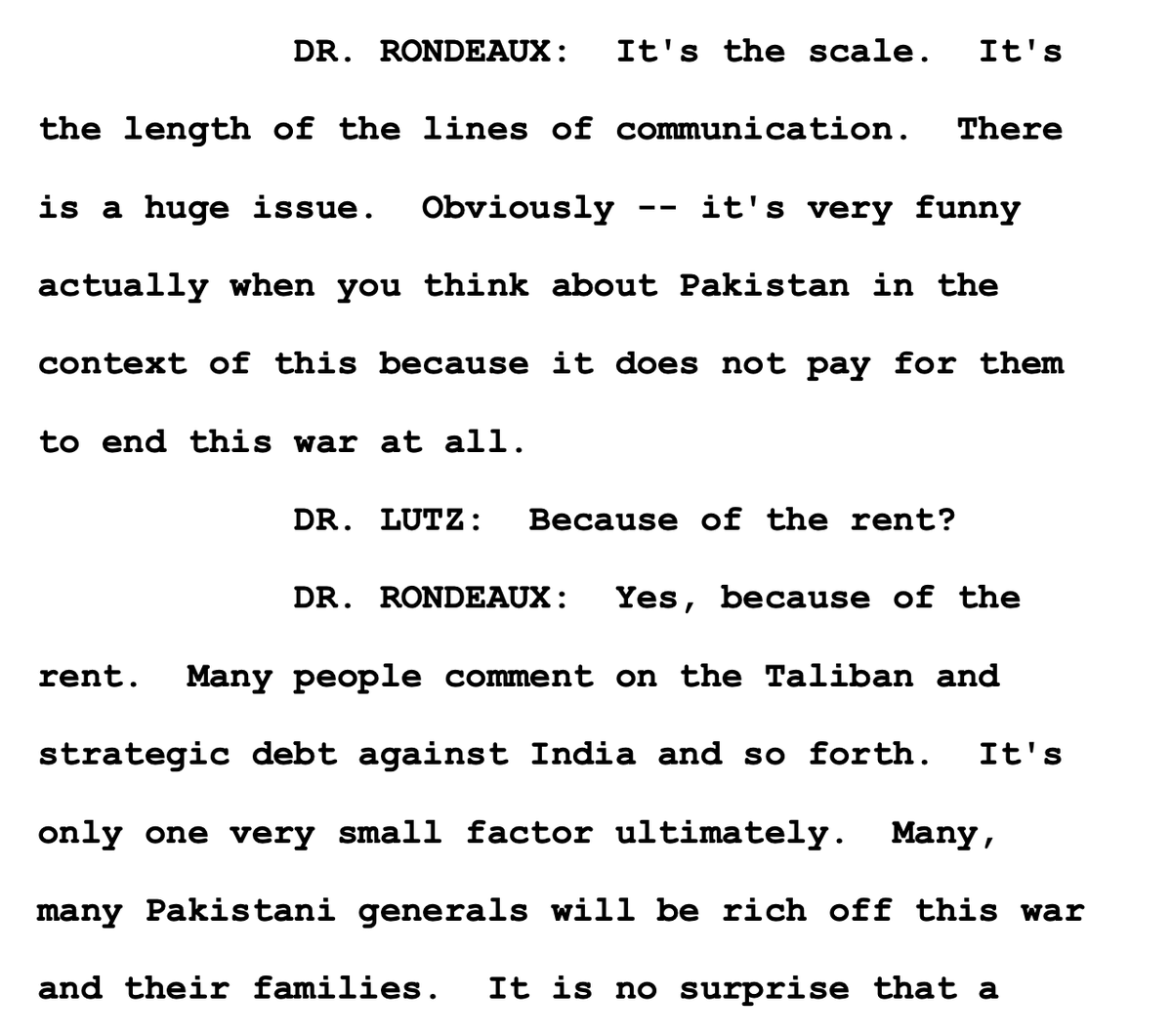

Six months after he was appointed, Bush didn't know who his top general in Afghanistan was, and didn't care. General McNeill had no guidance about what he should be doing in the country. 29/n 

US could only account for $890 million out of $3.7 billion spent on Commanders' Emergency Response Projects. 30/n 

Counter-insurgency theory was untestable and had no metrics to measure success, even if the money was spent well. 31/n 
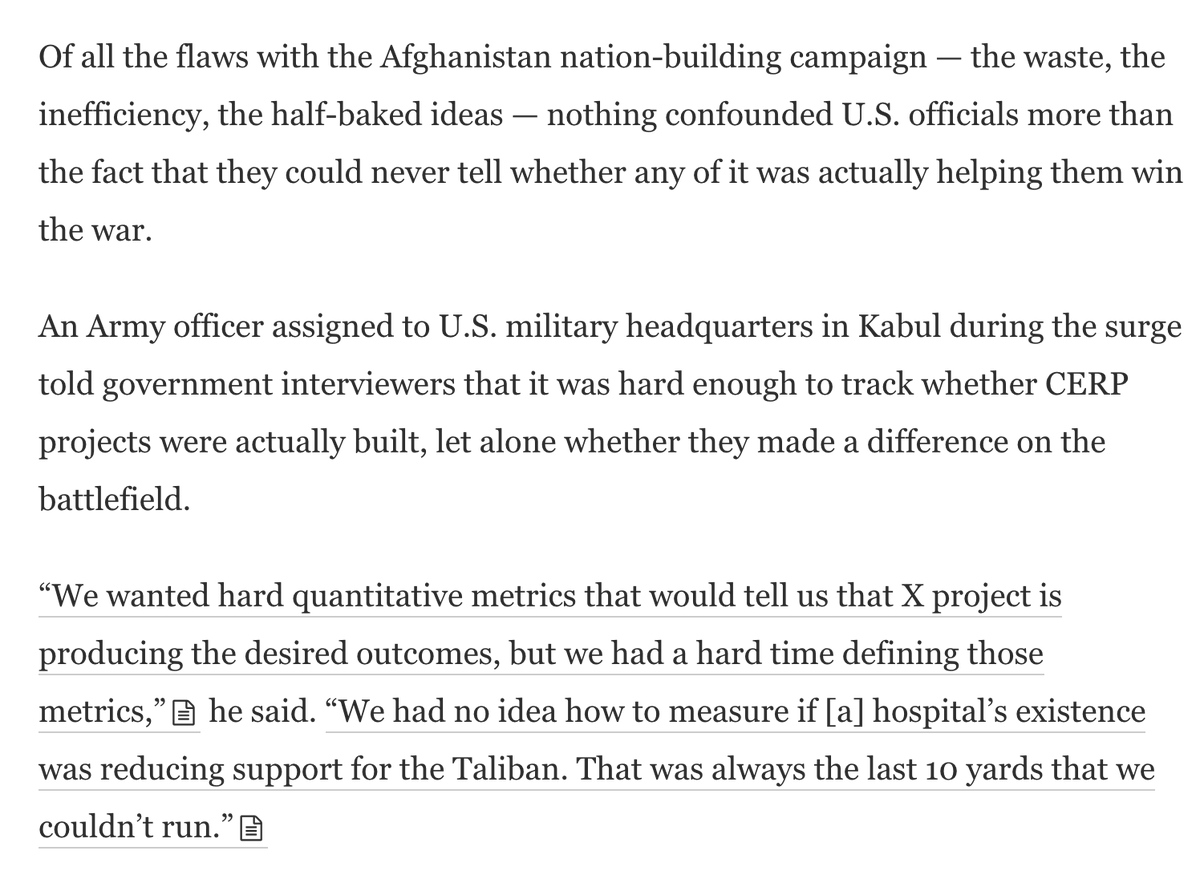
"Don't tolerate corruption!" Some say. Well, the beneficiaries were the only ones in the country working with the US. The problem wasn't that we tolerated corruption, it's that the whole project was impossible. 32/n 
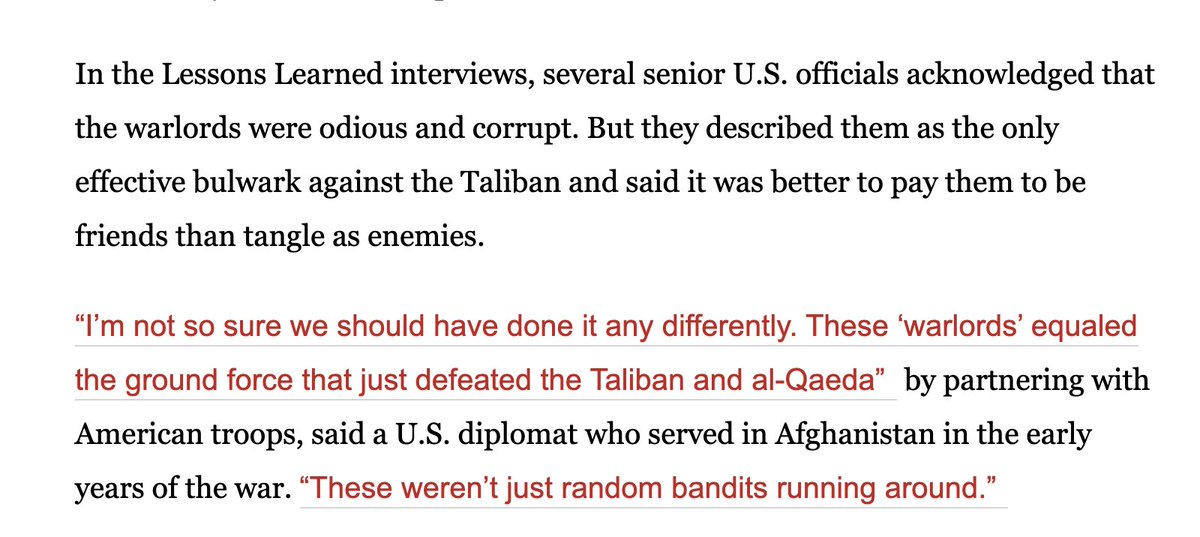
The US removed one governor for being a drug dealer, and things got worse, making the military wish he would come back. 33/n 


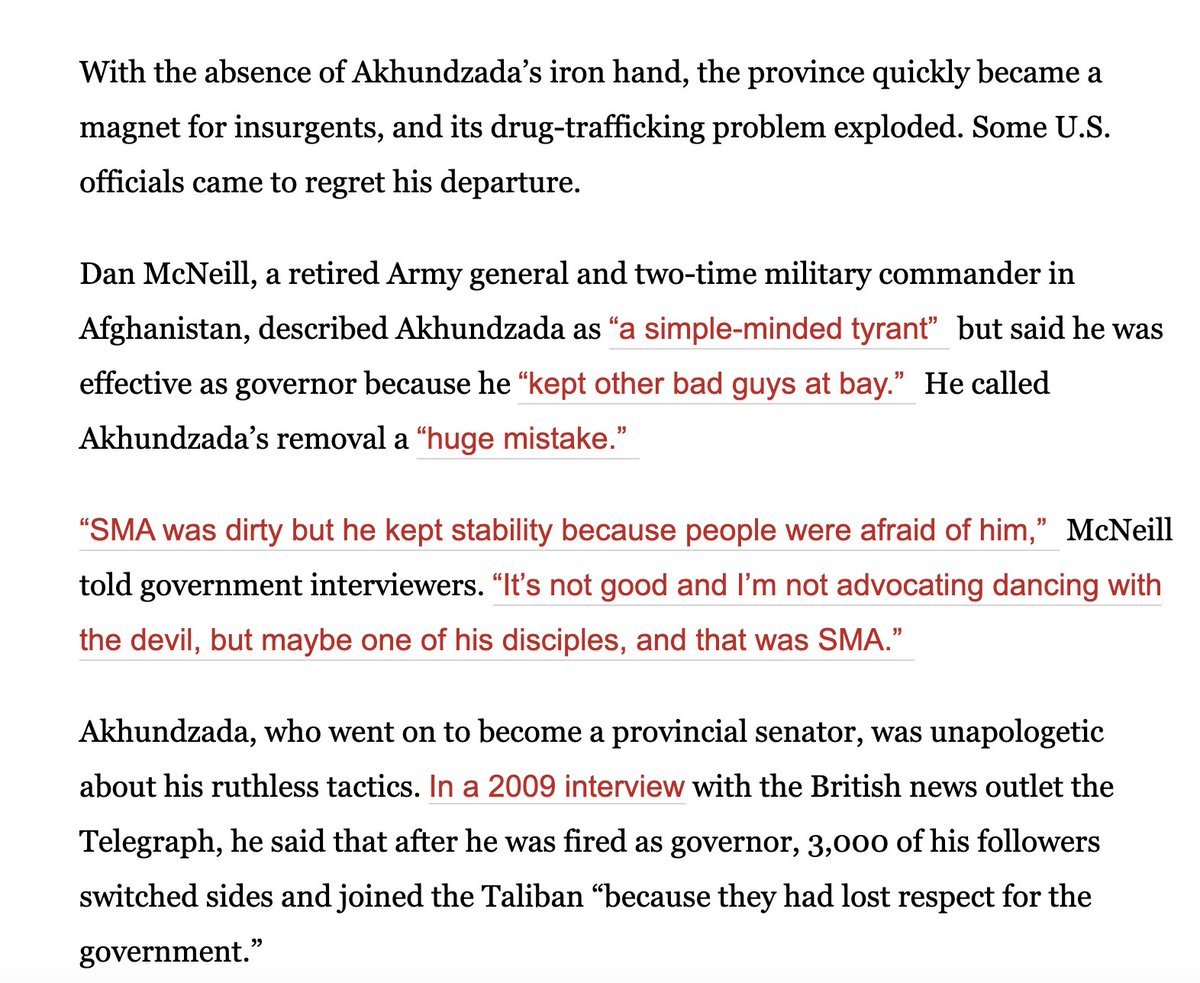
According to a US diplomat, it was better to give money to corrupt warlords that would spend it on their family and tribe than it would have been to waste in on western "experts." Says you can't spend money and track it too. 34/n 

Members of Afghan government stole $1 billion from Kabul Bank, equivalent of 1/12th of GDP the year before. 35/n 
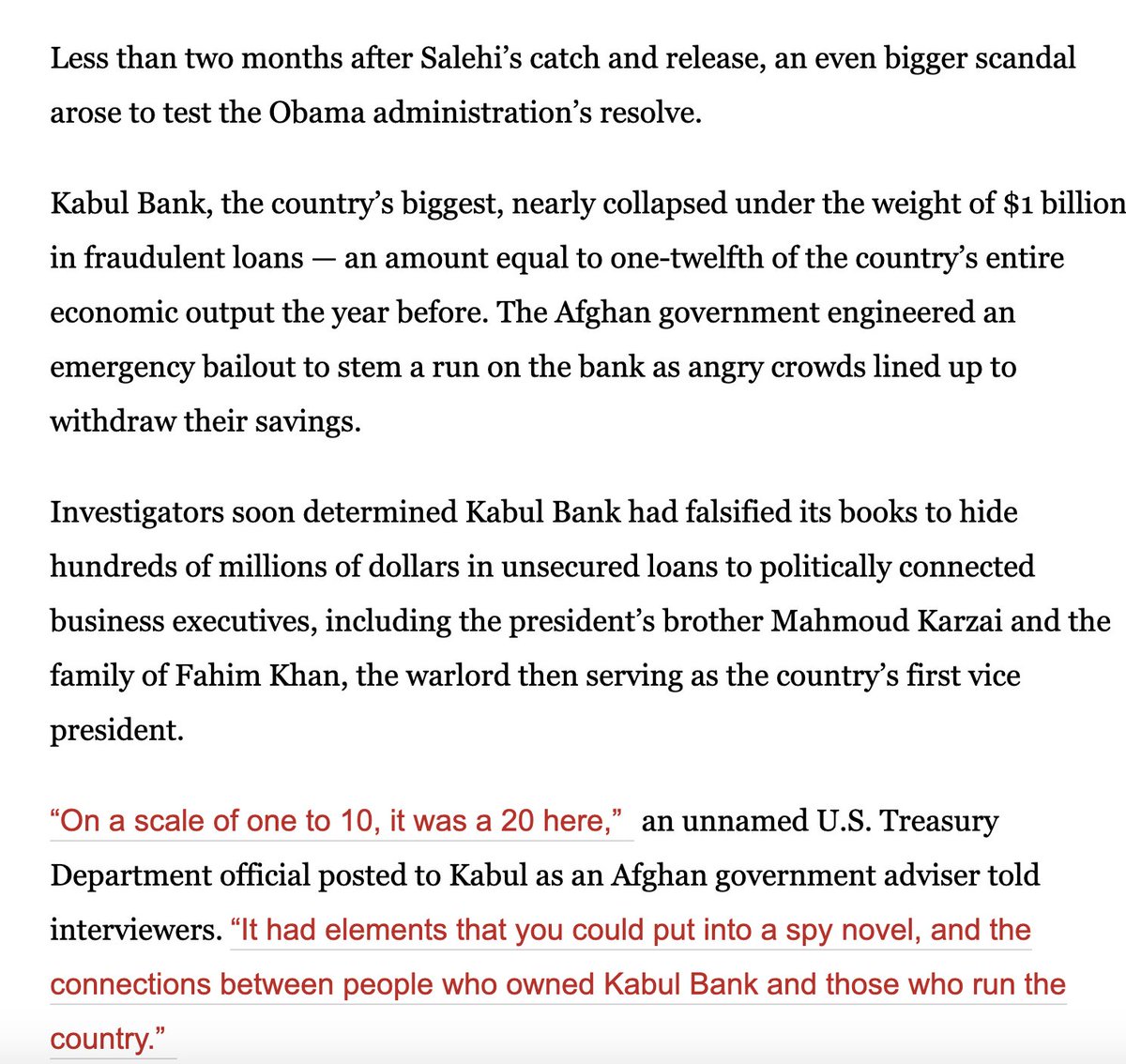
US diplomat, says better for money to "disappear in Afghanistan, rather than in the beltway." Seems to believe that Afghan corruption is small ball compared to the "consultants" and "experts" who make their living in Washington. 36/n 

US has trouble encouraging economic development in Tajikistan, since too many of their neighbors have been destroyed by the US or placed under sanctions. 37/n 

Ok, that's it for tonight. Will pick this up again soon. 39/n
General McNeill went to Afghanistan to lead the war effort, no one told him what his goals were. So they decided to do social work and reduce infant mortality because they had nothing else to do. Again, this was the top military man in Afghanistan, not some random commander. 40/n 

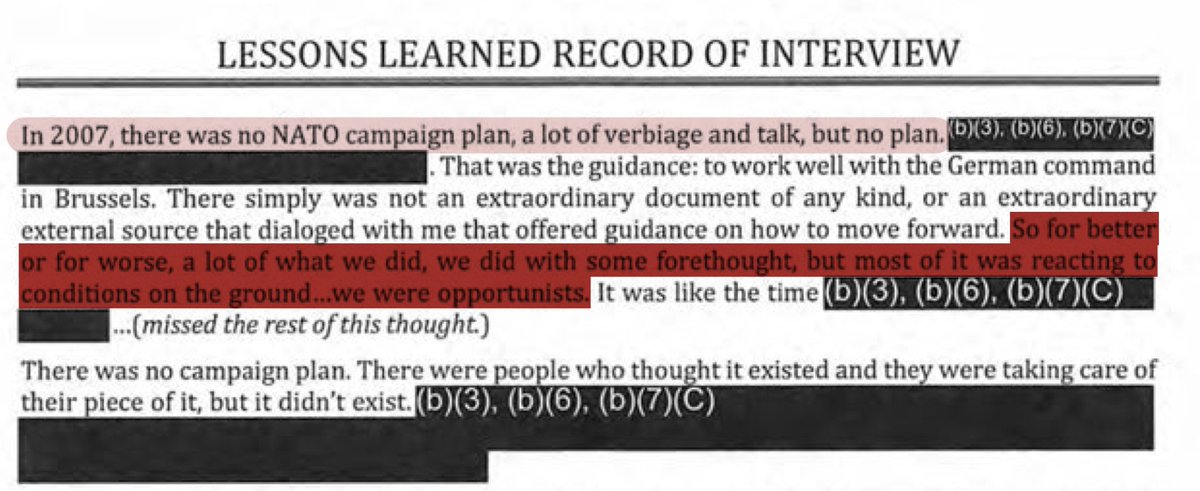

US decided to start spraying the poppy fields because it was quick and a way to spend money. John Wood, NSC Director for Afghanistan. 41/n 

Late in the war, the Afghan diaspora living in the US started to get in on the corruption, since they knew that having American passports made it easier to get away with. washingtonpost.com/graphics/2019/… 42/n 

Investigator gathered data on corruption, put it on thumb drives. Someone wiped the files and used them for movies. 43/n 

According to one audit, 40% of contract funds went to criminals, corruption, or the insurgency. 44/n. 

Almost a year after the start of the war, Rumsfeld wondering when there was going to be a plan about what to do for an Afghan army. 45/n 

British General David Richards says no one is to blame, blames "the system," before agreeing with everyone else that there was no plan. 46/n 


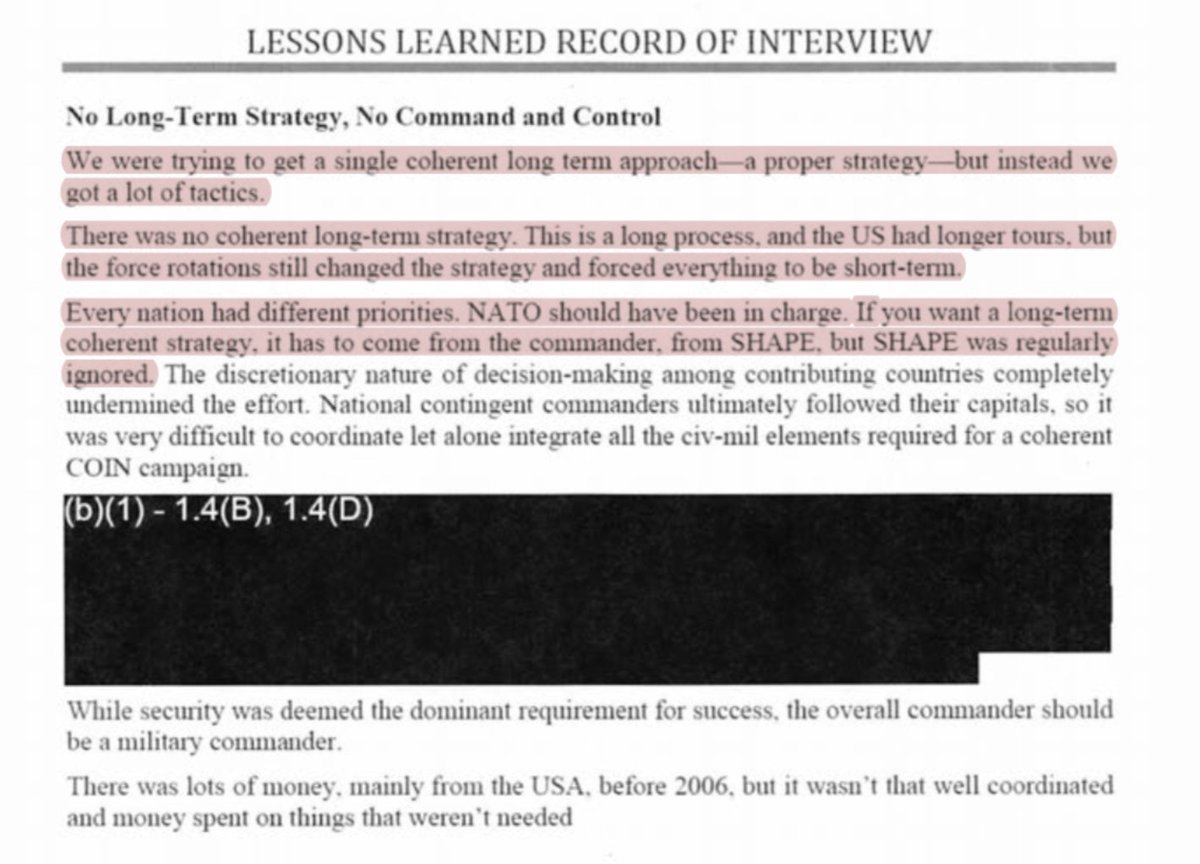
US bombed Canadian forces, who wanted to therefore stop their operation. They were told that they couldn't because the North Atlantic Council was in town, and it would be too embarrassing. 47/n 
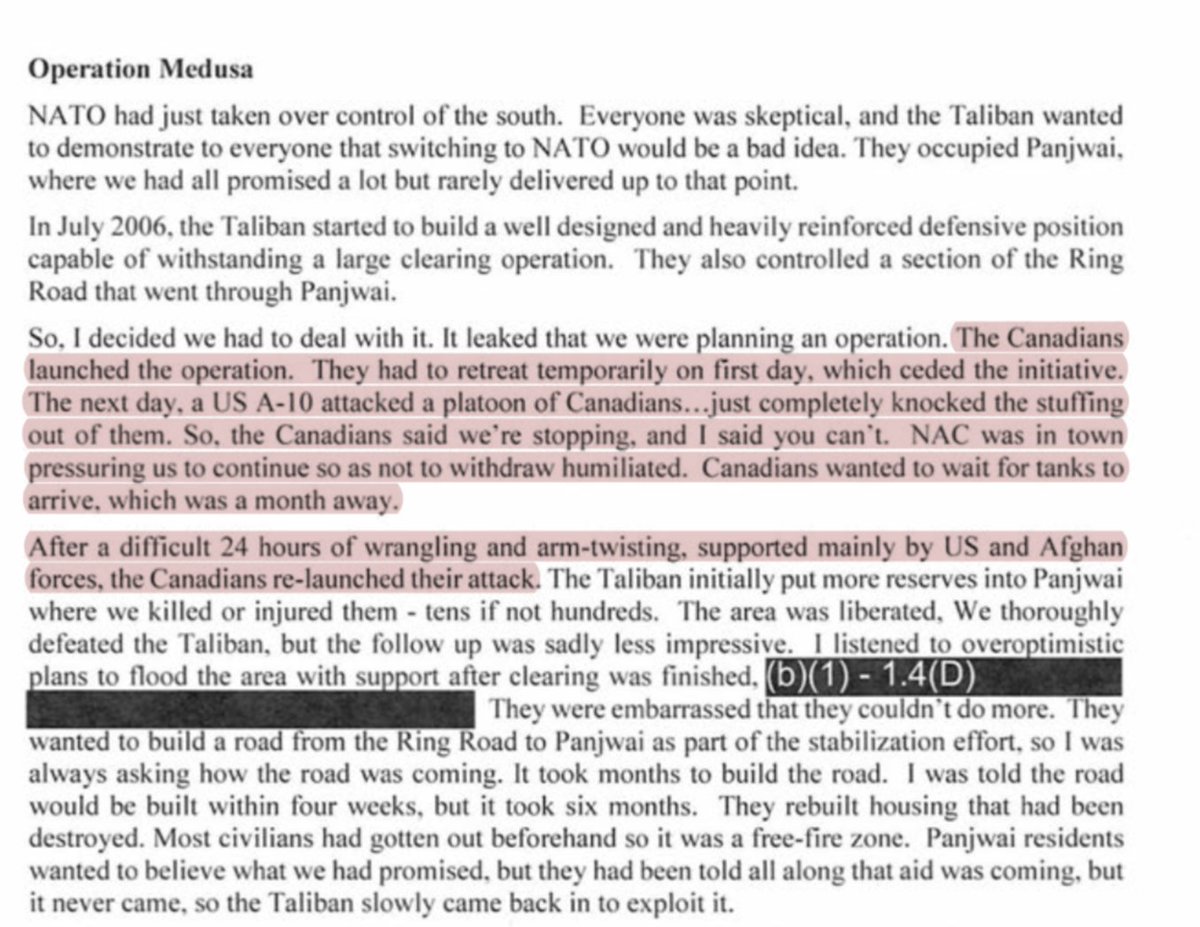
Rumsfeld philosophy was don't spend too much money, it would make the Afghans dependent. The Petraeus philosophy was to make major investments, win hearts and minds. Both failed. Those who think goals were achievable are like those who say real communism hasn't been tried. 48/n 
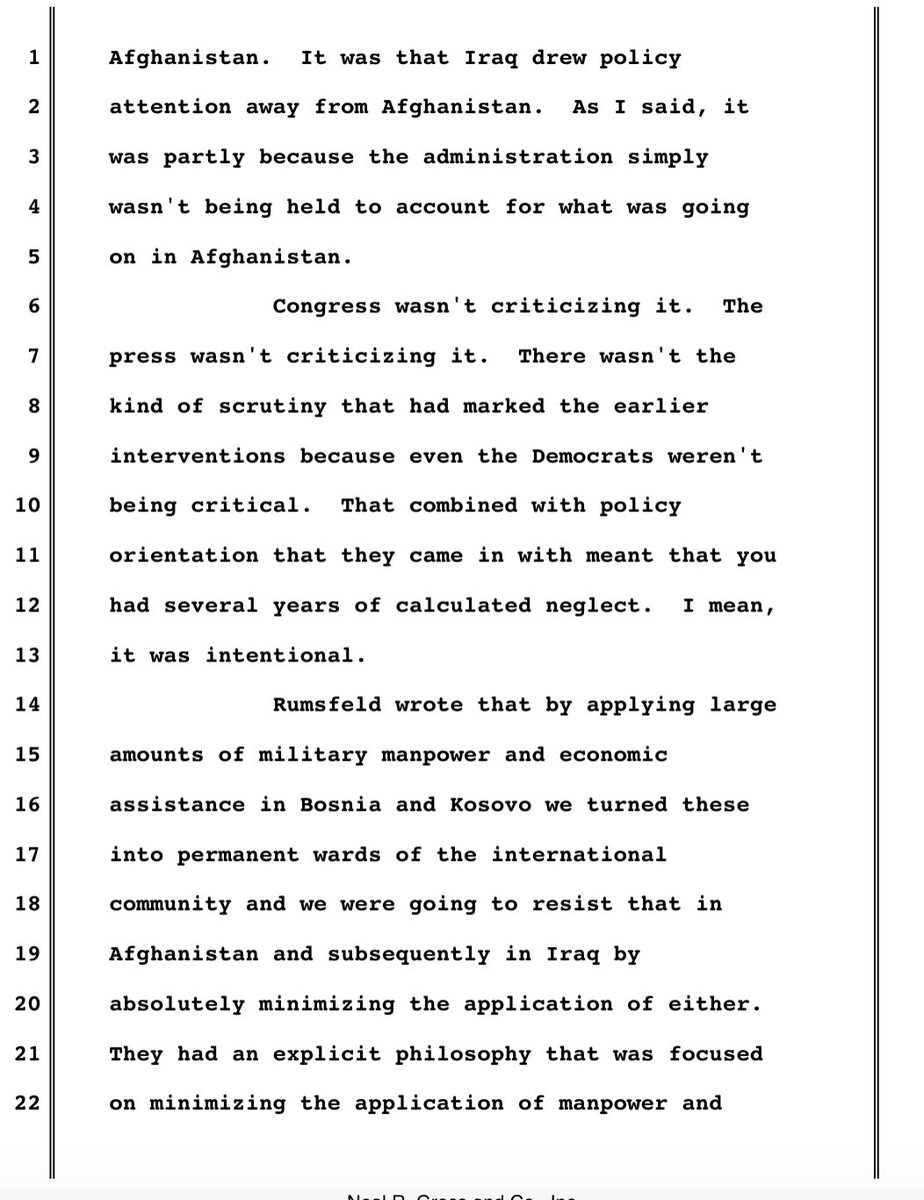
Afghan government can't even prosecute rape, robbery, and murder. Afghan official Ghulam Haider says Taliban never bothered building schools or hospitals, they just provided law and order, and that was enough. 49/n 

Soviets did a better job because they let local actors dictate priorities, rather than US and international community. That's how the communist government survived despite being opposed by 98% of the people. 50/n 
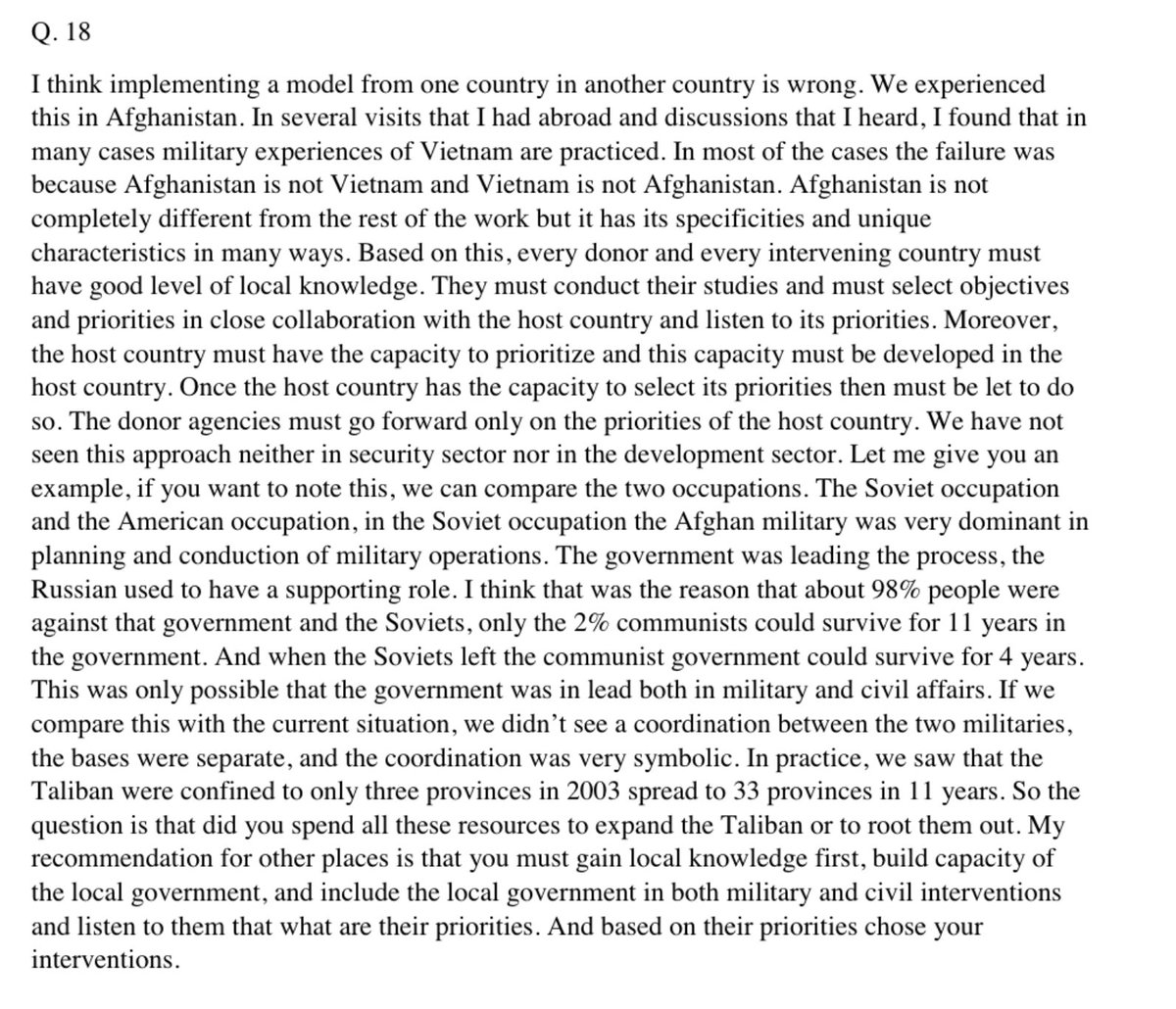
Colonel James Bullion compliments an ice cream plant for "respecting gender equality" (?), but blames Iran for making cheaper ice cream. Calls for protectionism for gender equal ice cream industry. 51/n 

Barnett Rubin: "Suppose the Chinese government occupied the US to provide better governance-and educational system, etc-and had teams of people with $10 trillion in cash, and none of those people spoke English. Would we be able to stop corruption?" 52/n 

Rubin: COIN was a substitute for political strategy. The background is that leaders found it too hard politically to talk to Taliban. So when Petraeus and other generals came along around 2009 and told them they could win through hearts and minds, policymakers jumped on it. 53/n 

COIN was invented by retreating powers, who could no longer impose their will on poor countries and couldn't just retreat. It's "politically correct", or politically convenient, warfare: what humanitarians want to do anyway is how you win war. But it does not work. 54/n 

Embassy official says what I said earlier in the thread. Tackling corruption and refusing to deal with all bad actors would have been a strategy closer to what we did in Iraq in 2003: work with nobody and make enemies out of everybody. 55/n 

Three unnamed researchers say they have developed a model to predict local instability, which they validated by retroactively predicting the Arab spring. 56/n 


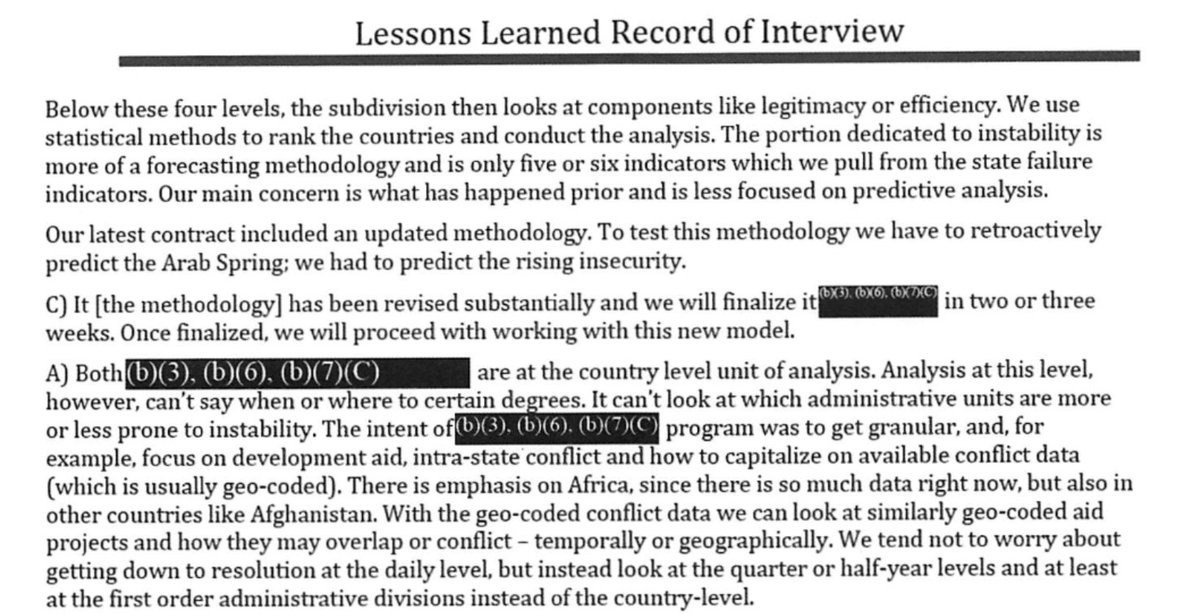
Here is an NSC official. Throughout the documents, you can find officials complaining about too much and too little money. This paragraph appears to do both. How can there even be too much or too little money when we don't even know what the goals are? 57/n 

Says we cannot fight a two front war like WWII any more. The idea that it's harder to fight the Taliban and in Iraq than imperial Germany and Japan is odd. The difference is that back then while the goals were hard, we could define them. 58/n 


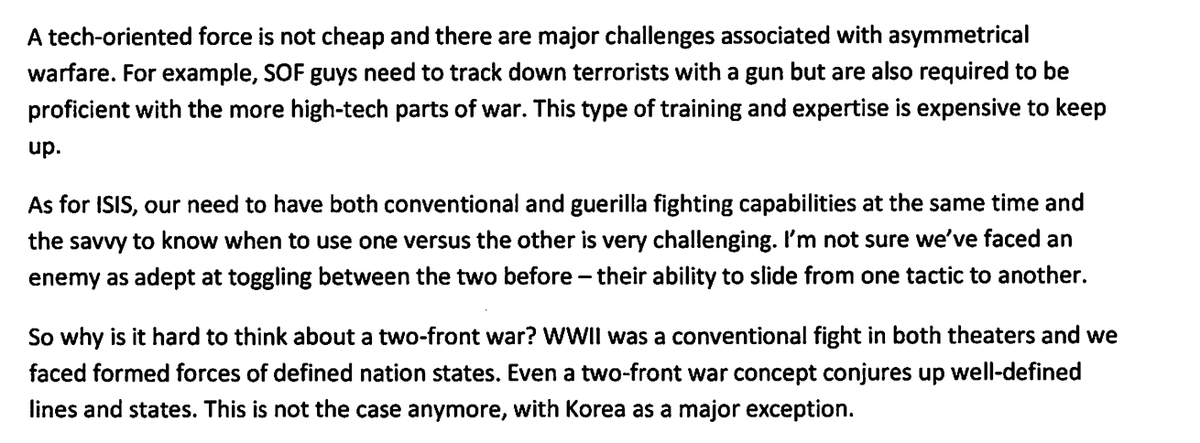
Unnamed State Dept official: "I have no tolerance for corruption." Seems to be split between civilians and military, the former was committed to "good governance" model, latter had to tolerate corruption in order not to get killed. 60/n 
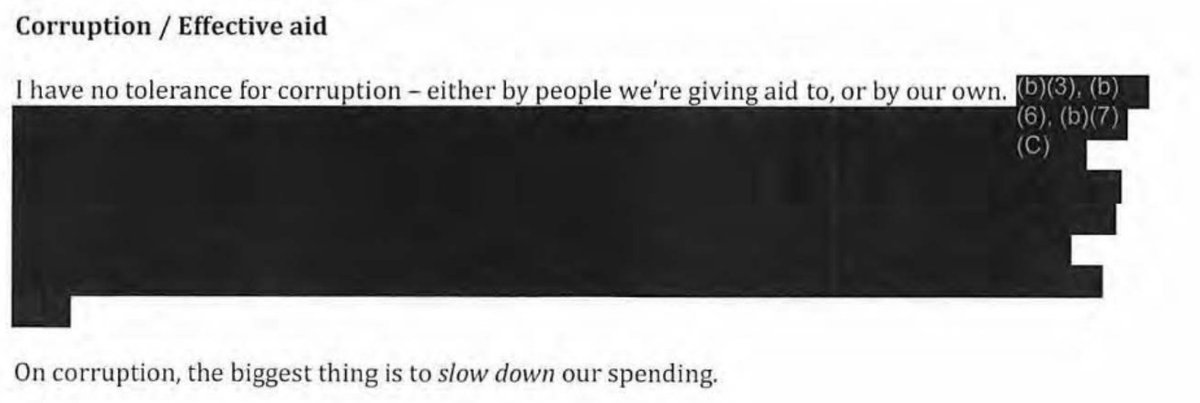
DOJ wanted to vet Afghan officials through polygraphs, Karzai resisted. Polygraphs have no scientific validity, but our government uses them, probably because of some polygraph lobby. When you see a stupid policy, pretty good chance it's making someone a lot of money. 61/n 

Unnamed US official says we do not focus enough on positive indicators. Checking one datapoint at random, as of 2016-17 Afghanistan is last in infant mortality. Second place is not even close. Don't know how this can be seen as success, particularly given the investment. 62/n 


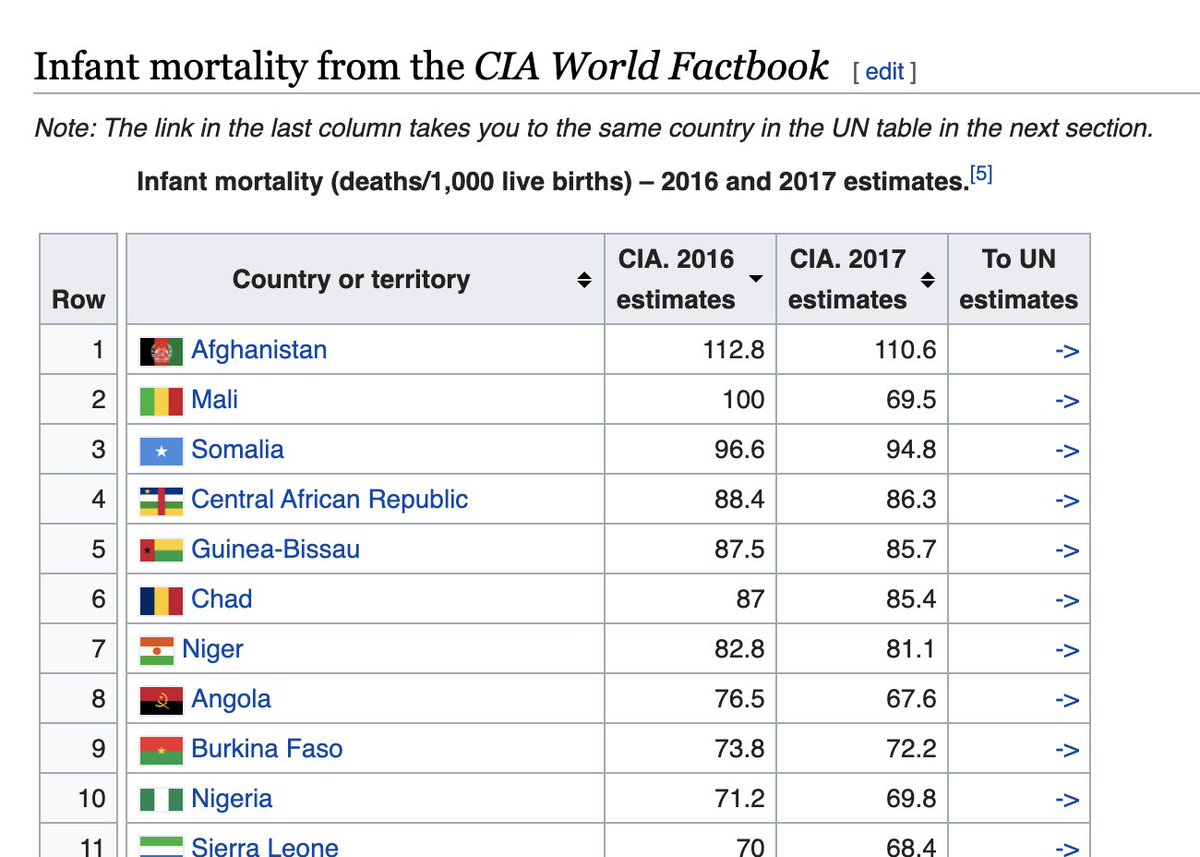
Afghan official says US priorities did not meet Afghan conditions, nothing to build up agriculture, massive investments in education without system being able to absorb graduates. Complains too "focused on the training of girls and minority rights and things." 63/n 

"We were pumping a lot of money in because we use the amount we appropriate through our budgetary system as a proxy for our level political commitment," which is why we had to give money to some "pretty nasty people." 64/n 

Treasury Department official: After the Kabul Bank robbery, US officials' top priority was to bury the story and make sure that the bad press did not prevent aid from continuing to flow. 65/n 

Senior USAID official: "we should have given strategic guidance (i.e. almonds)" The central planning fallacy is everywhere here, the hubris that it should be US bureaucrats rather than entrepreneurs and consumers that would chose the best crops to grow. 66/n 

US military advisor: US kept building empty schools next to each other that Afghans were not interested in, when this was reported to a superior, they "took great offense." This superior's name is blacked out, and there's probably no good reason why. 67/n 



Senior USAID official: there was an Afghan mayor who they thought was great, turned out he was embezzling government money and got killed in a battle for that money. 68/n 

USAID official: "focusing on gender made things more unstable because it caused revolts," and "gender had to be part of so many projects." This is a recurring theme through the documents, a lot of complains on both US and Afghan sides about focus on gender issues. 69/n 

USAID official: "I'd talk to infantry commanders and ask what they need and they'd say turn this money off. We're having to look for people and projects to spend money on." Credit to the military that they didn't just steal it. 70/n washingtonpost.com/graphics/2019/… 

USAID contractor says he never saw the Taliban providing services, yet the US would win by doing so. There are some deep assumptions here about the nature of state power that are going unquestioned. 71/n washingtonpost.com/graphics/2019/… 

USAID official says all Congress cared about was that they spend money, encouraged a high "burn rate." 72/n washingtonpost.com/graphics/2019/… 

Recommendation that the US should have followed Taliban strategy, provide only justice and security, rather than every conceivable service. 73/n 

US Army Civil Affairs Officer: "we let ourselves be treated as program managers just facilitating the spending of money
for money's sake." 74/n washingtonpost.com/graphics/2019/…
for money's sake." 74/n washingtonpost.com/graphics/2019/…

Even in safe areas, the cost of building a school that cost $250K doubled between 2005 and 2011 because nobody cared enough to negotiate with contractors. Instead, military made sure never to spend more than $1 for DVD. 75/n 



USAID never said anything was a bad idea or turned down a project. "We were told to just keep spending." 76/n 

USAID official said that they rewarded bad behavior, funded the violent regions but not those that were peaceful. The ideas that local aid increased violence in Afghanistan has support in the literature. Especially true for large projects. 77/n washingtonpost.com/graphics/2019/… 


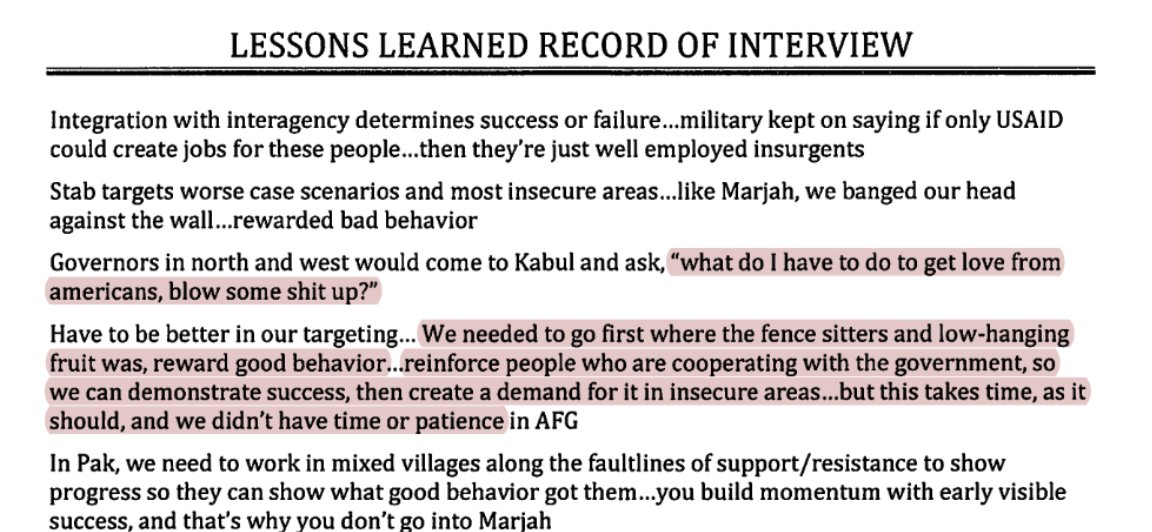
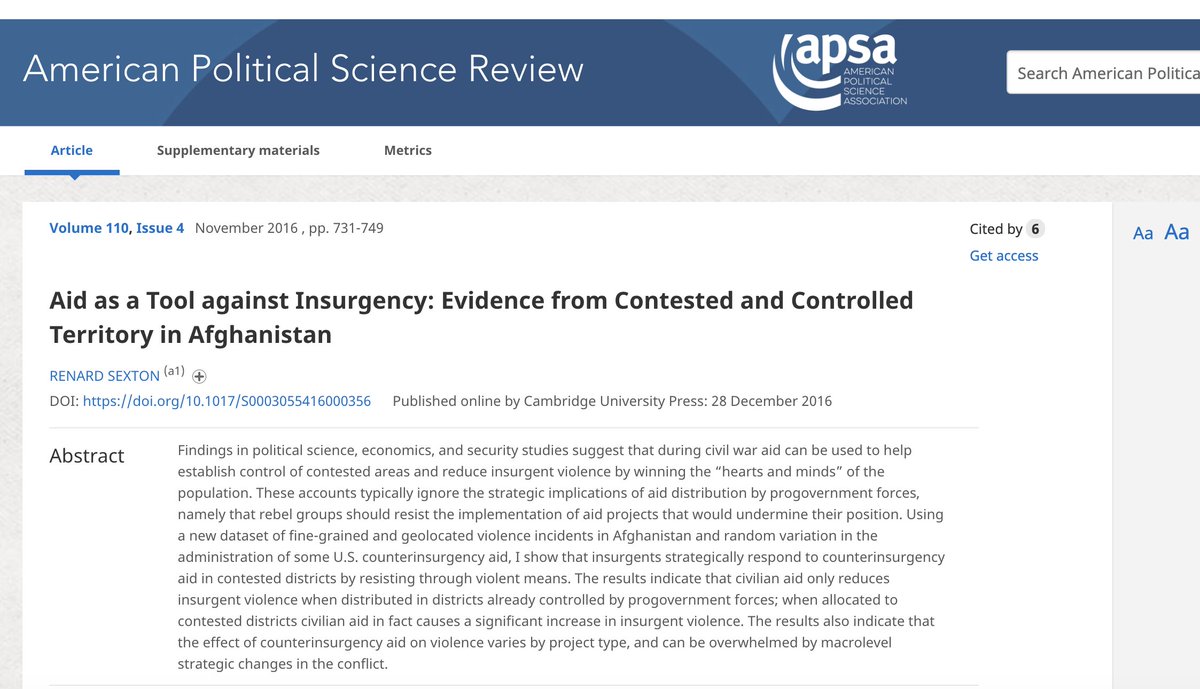

USAID official: "If you can't hold an area, don't clear it... if an area is [Taliban] controlled, how do you justify not killing everyone there?" 78/n washingtonpost.com/graphics/2019/… 

Senior British official says that they took sides in battles between drug dealers, which they mistook for counter-insurgency. 79/n 

US Embassy official in 2016 says they learned their lessons in Afghanistan, which they're now applying in Syria. 80/n 

Senior State Department official accuses men in DC of being "anti-woman-at-the-table." Says they only care about numbers. Others claim that the US collected not enough data, or that they were measuring the wrong things. 81/n 

Same official says Obama doesn't realize you have to kill enough people, he or she is sick of Obama saying he's sick of war, since only 5% of Americans are involved in the war, so it doesn't affect them. This from a government that has spent trillions over the last 20 years. 82/n 

This State Department official really does not like Obama. Goes on to say that the president didn't understand that the world needs US leadership. "We are representatives of all past dynasties rolled into one." 83/n washingtonpost.com/graphics/2019/… 

US or NATO official says Stephen Biddle was a nice guy. I can confirm first hand that this is true. 84/n 

Senior NSC official says that it was impossible to create good metrics, and the metrics never influenced policy anyway. Officials would present bad statistics when things started so that they could then claim that things got better. 85/n 

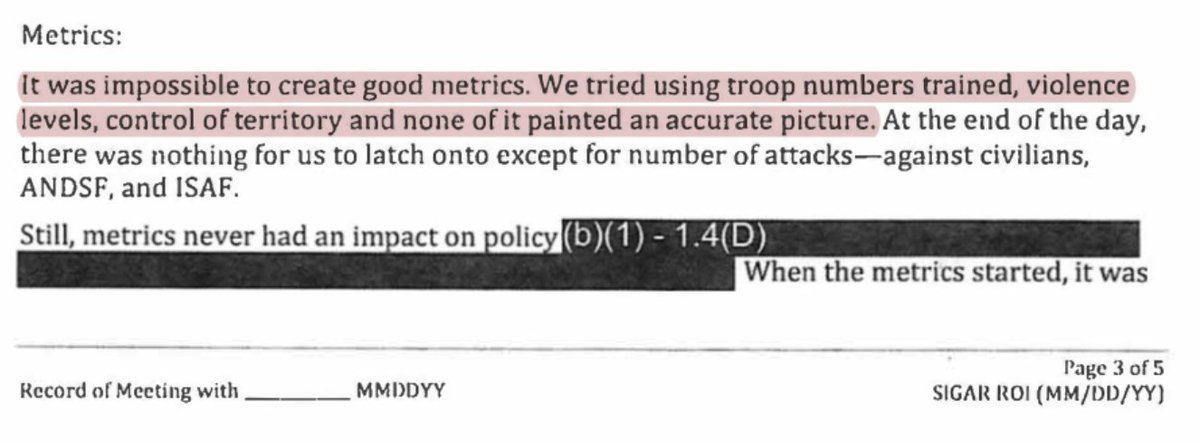

Statistics were manipulated so it would look like everything would deteriorate if American forces left. The part immediately preceding that section is blacked out. 86/n washingtonpost.com/graphics/2019/… 
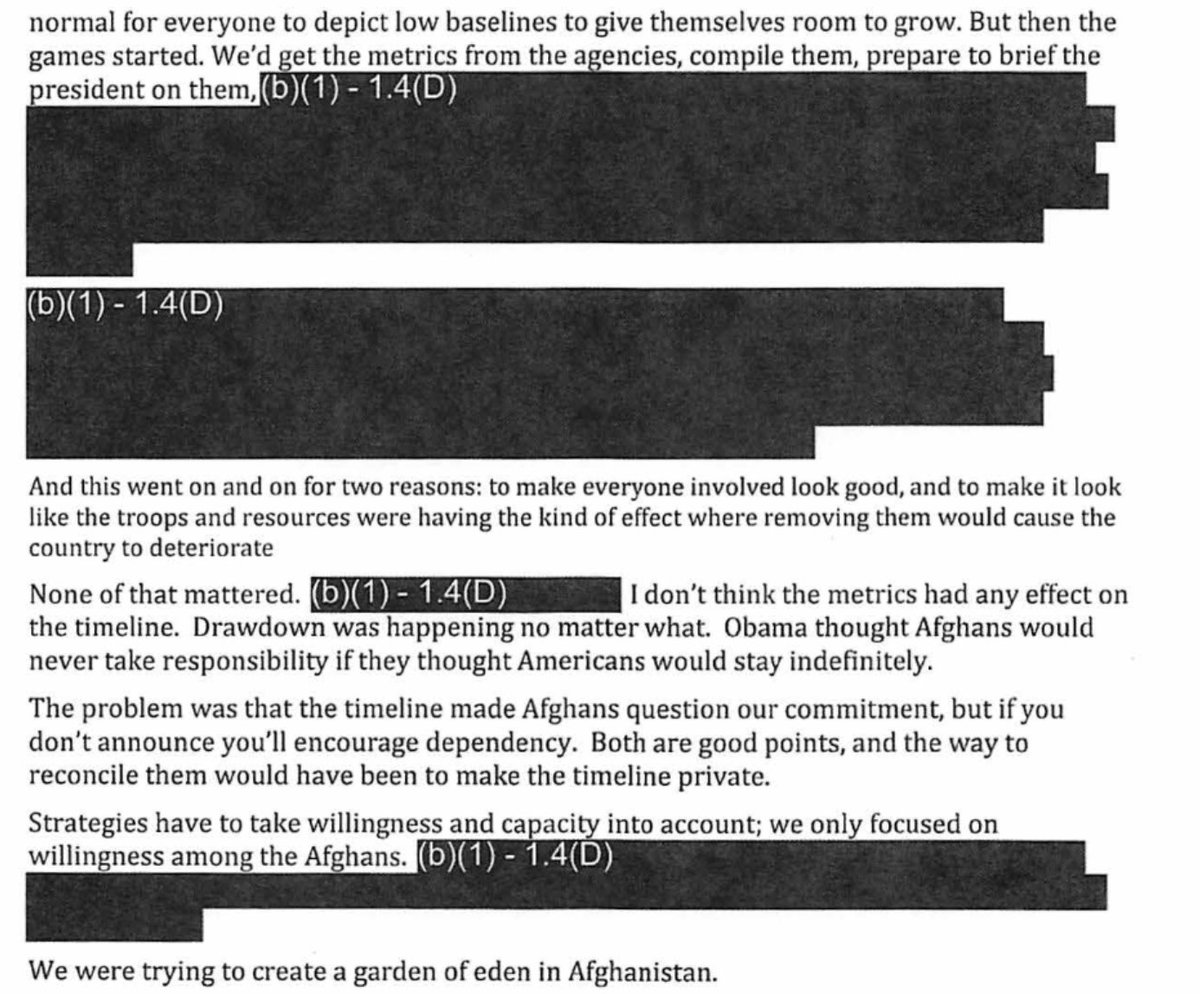
NATO official says Afghan officials were encouraged to go south, where they would have offices without electricity or water and be kidnapped or killed by the Taliban. They understandably did not want to go. 87/n washingtonpost.com/graphics/2019/… 

"COIN was a magic term that would make everything ok." World Bank wouldn't go near Kandahar power project because the assumptions made no sense, top generals wanted it anyway. 88/n 
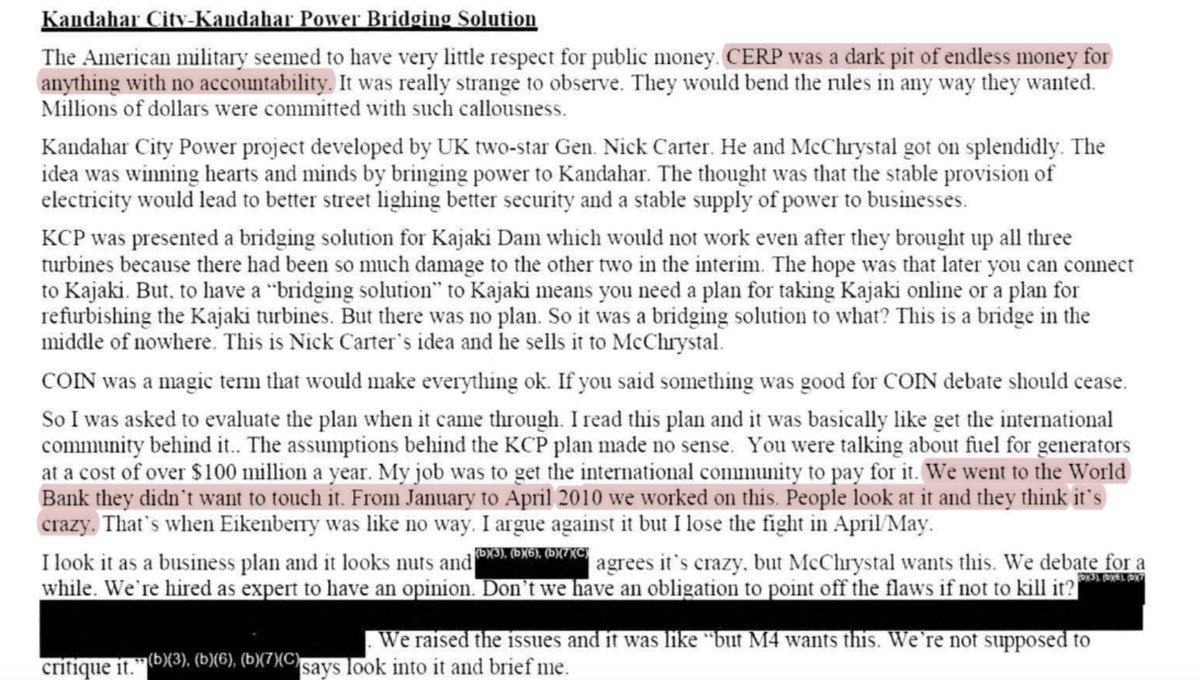
Afghan Minister of Finance begged General McChrystal not to undertake the Kandahar project. McChrystal didn't care, top American leaders thought anyone who didn't want to do it wasn't smart enough to understand the rigorous science of COIN. 89/n 

By 2009, there was no more al-Qaida in Afghanistan. But al-Qaida was the whole point of being there, so General McChrystal had to say that al-Qaida was still there to continue justifying the war. 90/n 

General McChrystal would manipulate choices available to political leaders to get the policies he wanted. 91/n 

Special Forces Officer says the only mission they were given was basically "go do good things." 92/n washingtonpost.com/graphics/2019/… 

Same Special Forces Officer says Afghan police were so bad, that the few who cared about their job seem amazing. 93/n 

NATO official says that Afghanistan was seen as a "benevolent environment" to do stabilization operations (!). The main criterion for finding local people to work with was that they spoke English, it sounds like that's how Karzai got his job. 94/n washingtonpost.com/graphics/2019/… 



US official says "our careers are based on moving forward, not looking back." 95/n washingtonpost.com/graphics/2019/… 

US spent most money on indefensible projects in most dangerous areas. Schools were built without teachers to staff them, they instead became bomb making factories for the Taliban. 96/n washingtonpost.com/graphics/2019/… 

Even at the start, no idea of what the mission was. Nation building and women's rights seemed just as likely to be the goal as fighting al-Qaida. 97/n washingtonpost.com/graphics/2019/… 

NSC Official says sometimes the Americans would know an Afghan leader was corrupt, but the military had to work with him. Again, a Catch-22, and it's easy to see how the commanders on the ground could think that tolerating corruption was the least bad option. 99/n 


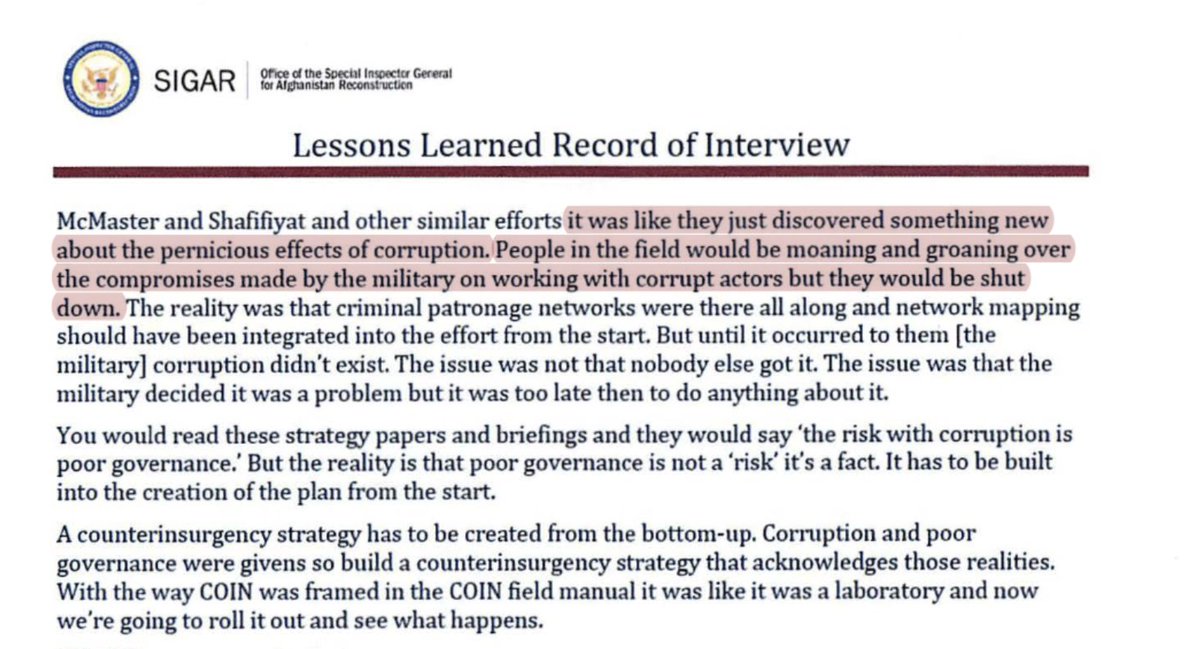
US budgeting official says that budget requests were driven by need to pay large staff and make sure that the war in Afghanistan was as expensive in Iraq. 100/n washingtonpost.com/graphics/2019/… 
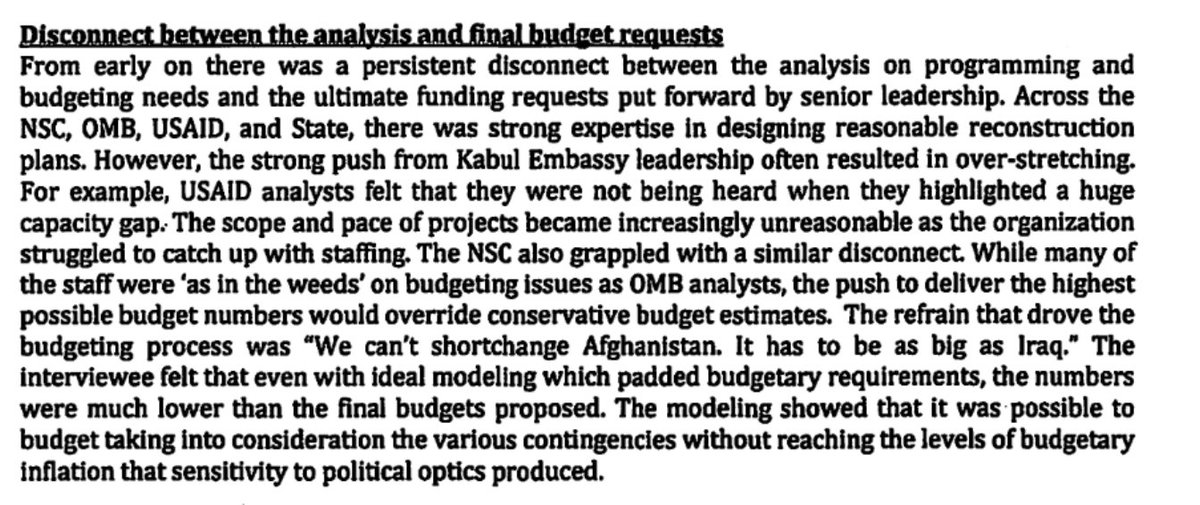
Senior State official says the Kabul embassy did not like to plan with the military, acted as if it was in a country not at war. 101/n 
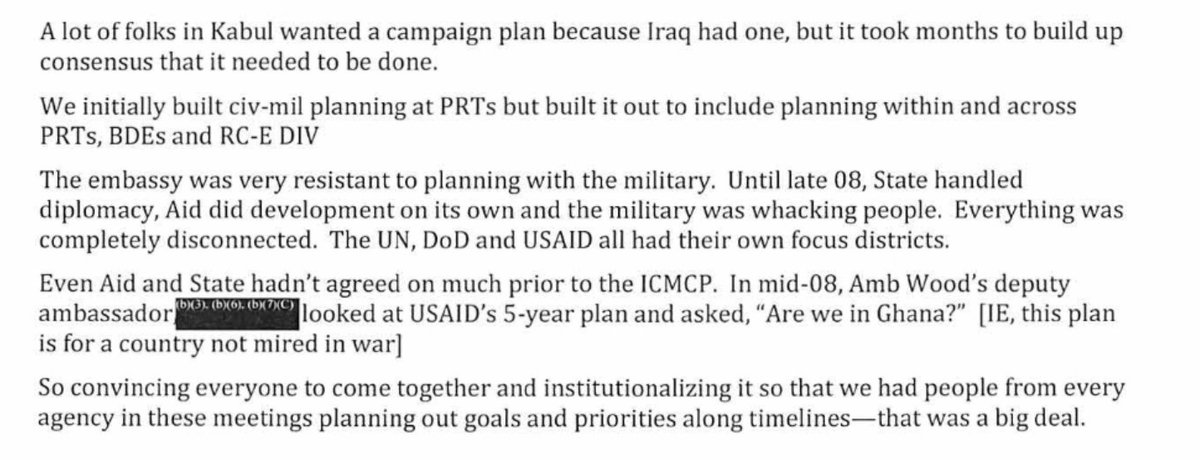
USAID official says that Defense Department did not understand the need for work on gender, health, and education. Richard Armitage ended debate on the topic by saying "you want to say we don't care about gender?" This logic could justify an unlimited mission, and it did. 102/n 

At the Ministry of Finance, 80% of the staff was illiterate. The top official, Ashraf Ghani, would personally open the door if you went there. 104/n 

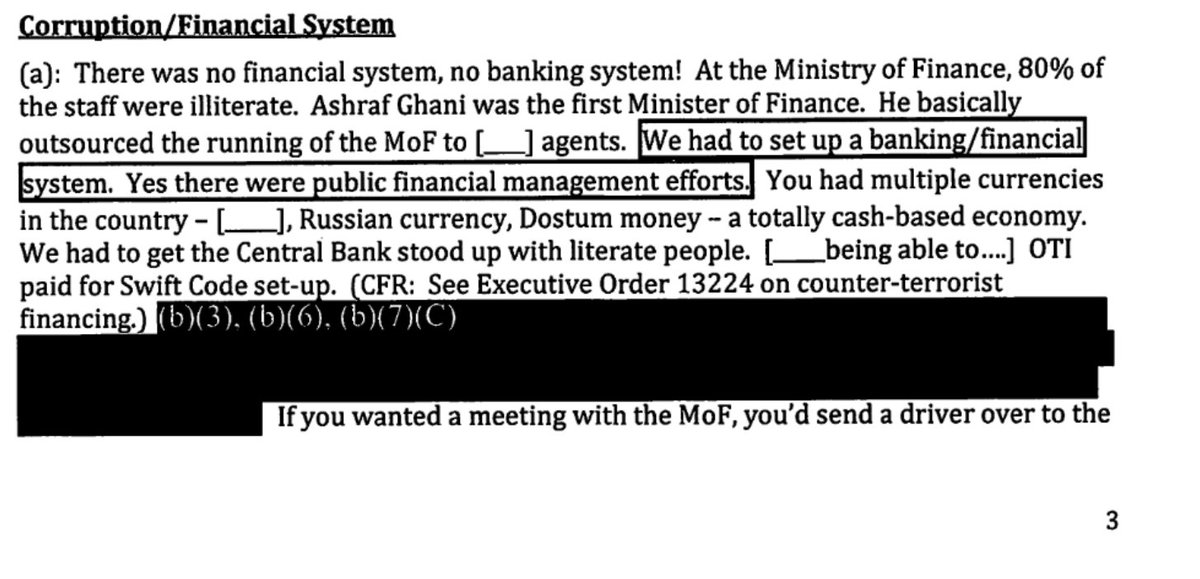

By 2010-2015, some Taliban are being reintegrated, but getting killed for it. In local power struggles, different sides are labeling each other "Taliban" so US or Afghan government will go after them. 105/n 



State official: schools were symbolic. US could always say "at least we built schools" to justify the war. Afghan women on councils much sharper than men, must be included in economy and government. These themes emerge usually from civilian officials, less from military. 106/n 

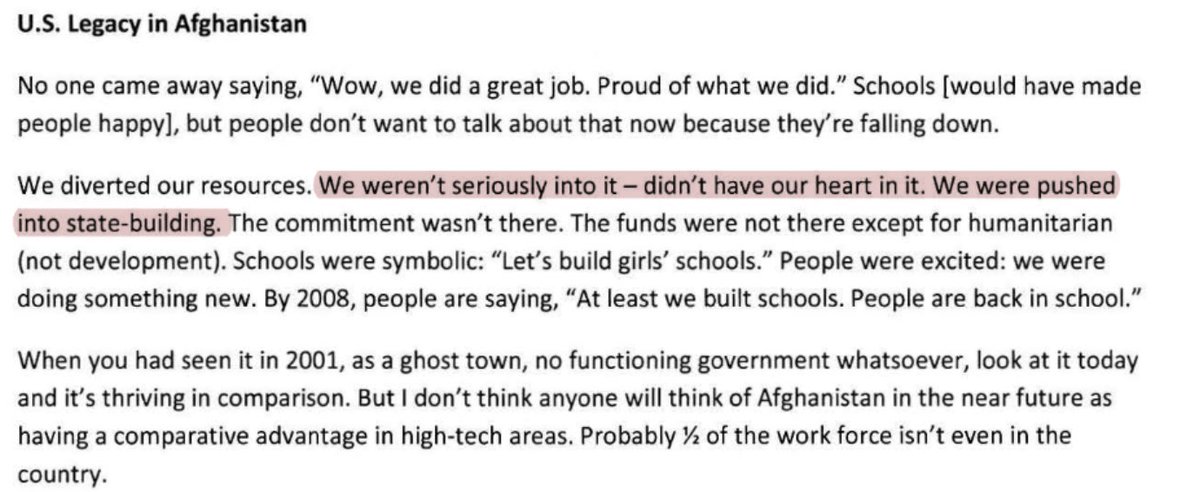
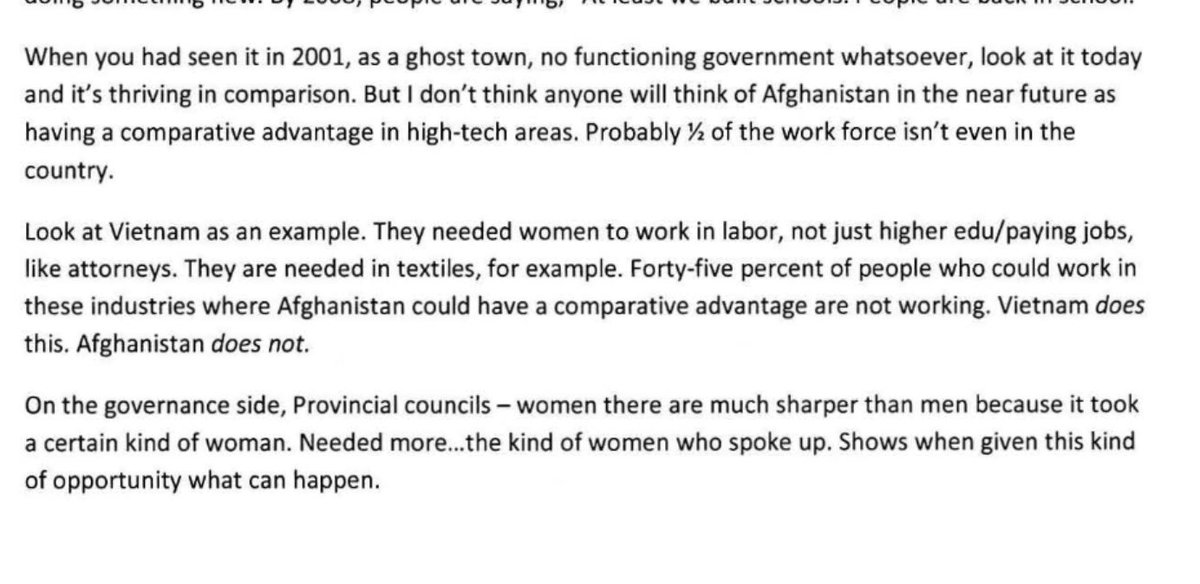
Senior Defense official blames State for spraying poppy fields, military refused to do it, says it was done over the objections of Khalilzad and Karzai. 107/n 

Stephen Hadley says nation building and a "democratic framework" are the only ways to make sure that al-Qaida doesn't come back. 108/n 
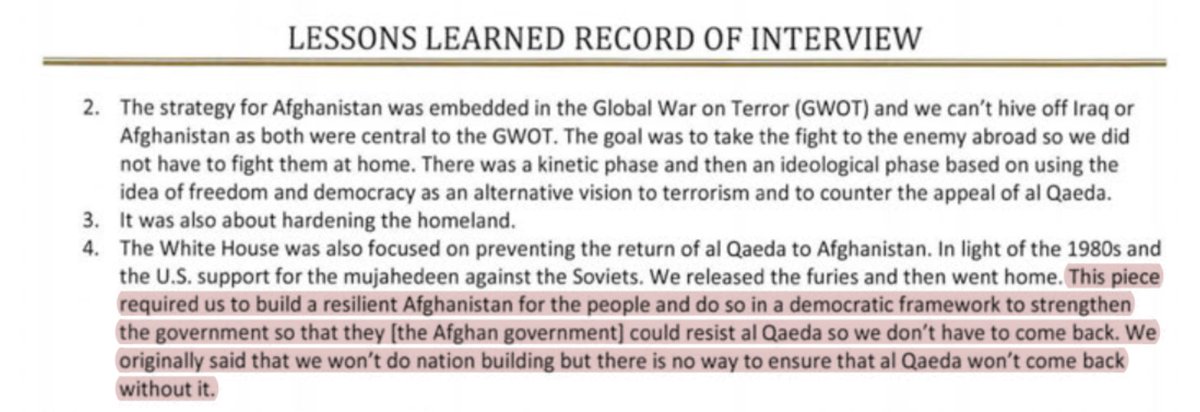
Hadley blames Karzai for relying on patronage and not democracy. Maybe he just needed to believe strong enough in democracy, but maybe he knew his country better than the US did, especially since our leaders admit we knew nothing? 109/n 
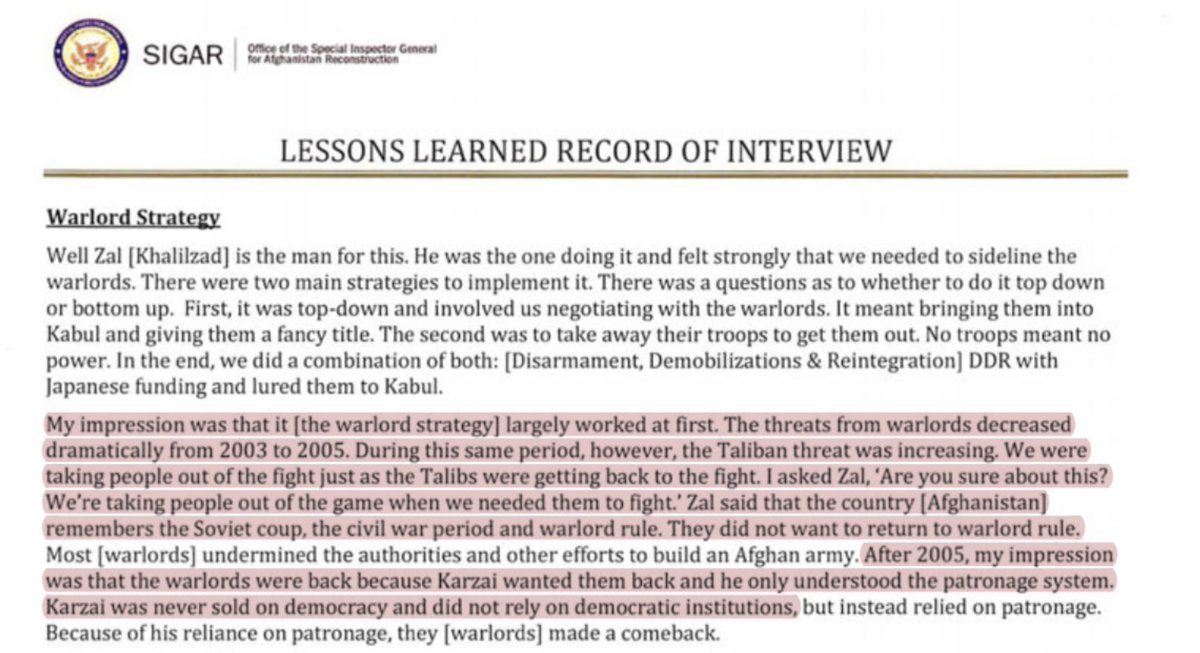
So while earlier in the war the military did not want to do counter-narcotics, by 2009 they had switched positions under Petraeus who wanted to do everything. Violence went up under his command. 110/n 
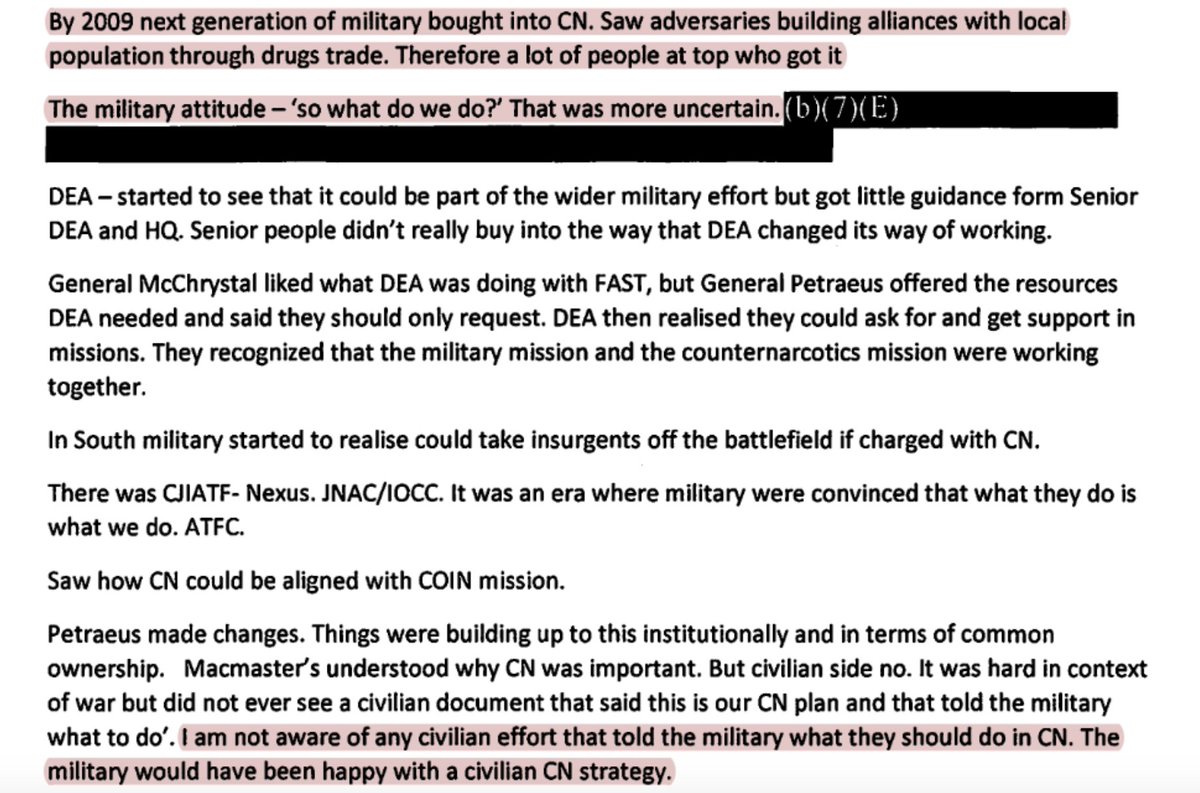
Marin Strmecki, adviser to Rumsfeld, says Afghanistan could have been South Korea, blames Obama for talking about nation building with contempt. Obama is a paradoxical figure in all of this, instincts against intervention, but gave us the Petraeus surge, made no one happy. 111/n 

Officials often ask why couldn't the US just find out what grows best in Afghanistan and teach the farmers there to grow it? Seems like Afghan farmers had already done a fine job of figuring out what was the most profitable crop for their country, and it was opium. 112/n 
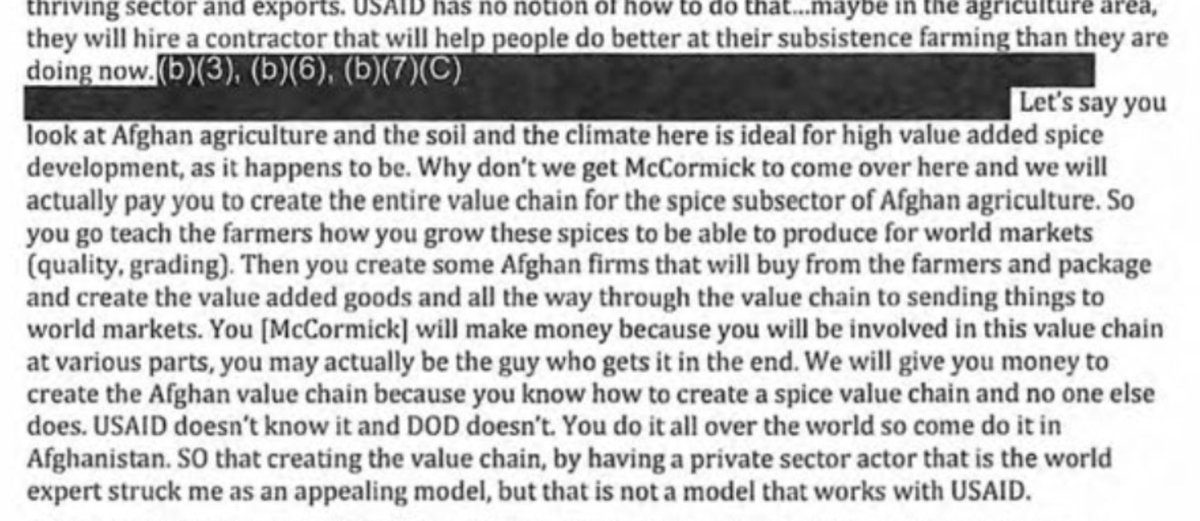
Regarding property rights, Afghanistan does not lack documents, the problem is that none of them agree about who owns what. 113/n 
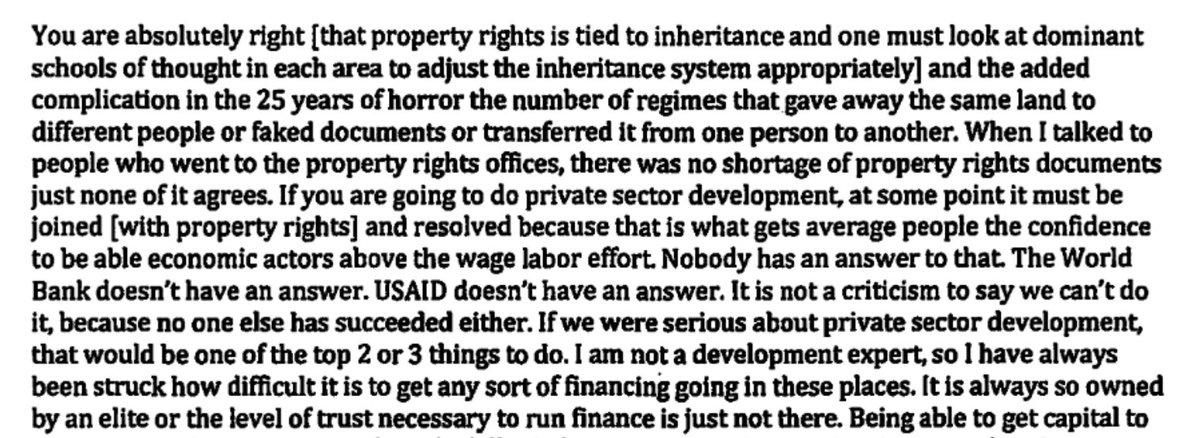
Done for tonight. Will pick up tomorrow. 114/n
Ambassador Robert Finn explains Afghan corruption in understanding light. You take care of yourself and the people close to you, because one day soon you could be out of power and victimized by others. Compares it to Mayor Daley, says thought at least he got things done. 115/n 
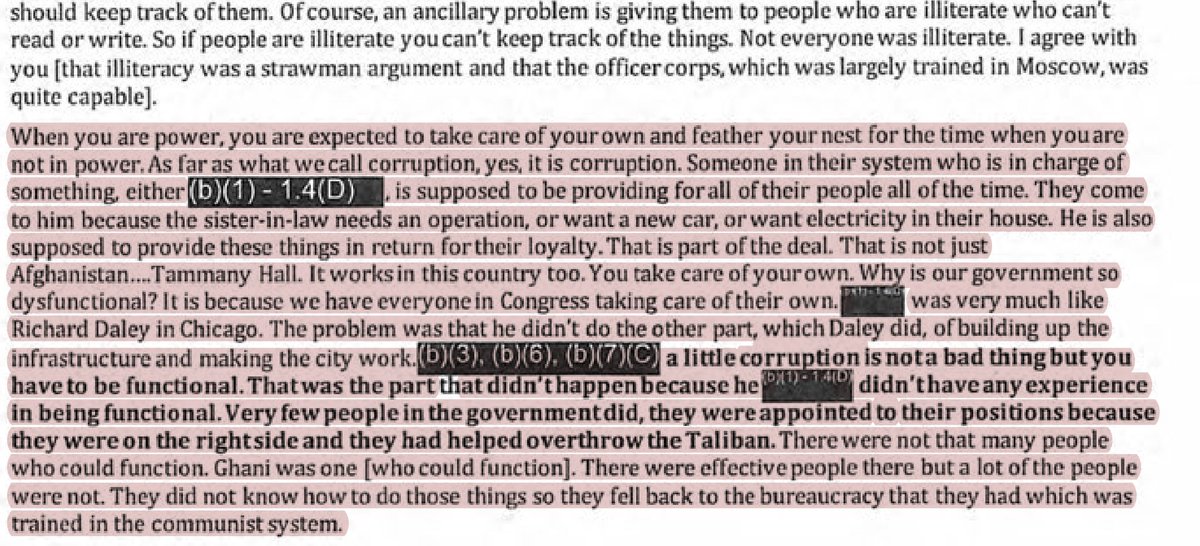
Brian Copes, a brigadier general, says USAID has lost its way. Seeks to perpetually be involved in projects to justify its existence, keep locals dependent. Repeats what many others have said, that the goal was to spend money and nobody cared why. 116/n 



Former Head of NATO, a British General, say US couldn't focus on Afghanistan because the best minds in our government were working on Iraq. Yet if anything we screwed up Iraq worse, so I don't know how valuable it would have been to have the A team in Afghanistan. 117/n 

Argument that Afghanistan wasn't normal corruption, but a kleptocracy. People would buy positions and expect to make the money back. 118/n washingtonpost.com/graphics/2019/… 
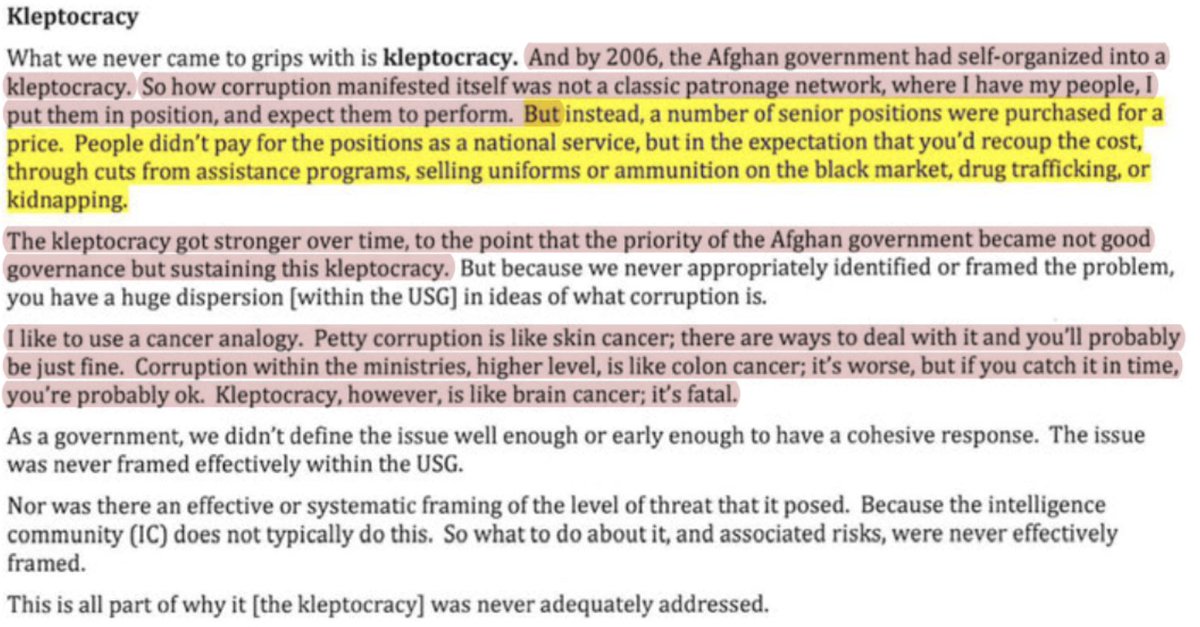
Tackling corruption would have destroyed the relationship with Karzai, been "self-defeating," according to some. 119/n 

Some American officials advocating flying corrupt Afghan officials to the US to face trial. Of course, doing so would have gone against all public messaging about the war. 120/n 

Former governor of Helmand said he asked USAID not to give people tractors, people wouldn't even be able to agree on who owned it. They did so anyway, and it turned out how he predicted. 121/n washingtonpost.com/graphics/2019/… 

US did not buy local food to help the market. Helmand governor says local food could have been brought up to health standards, and knowing what Americans prioritize, says "we could have made them women bakeries." 122/n 



Under the Taliban, money changers would leave their cash under a sheet and go pray, did not worry about it getting stolen. Taliban was also able to successfully suppress opium production. 123/n 
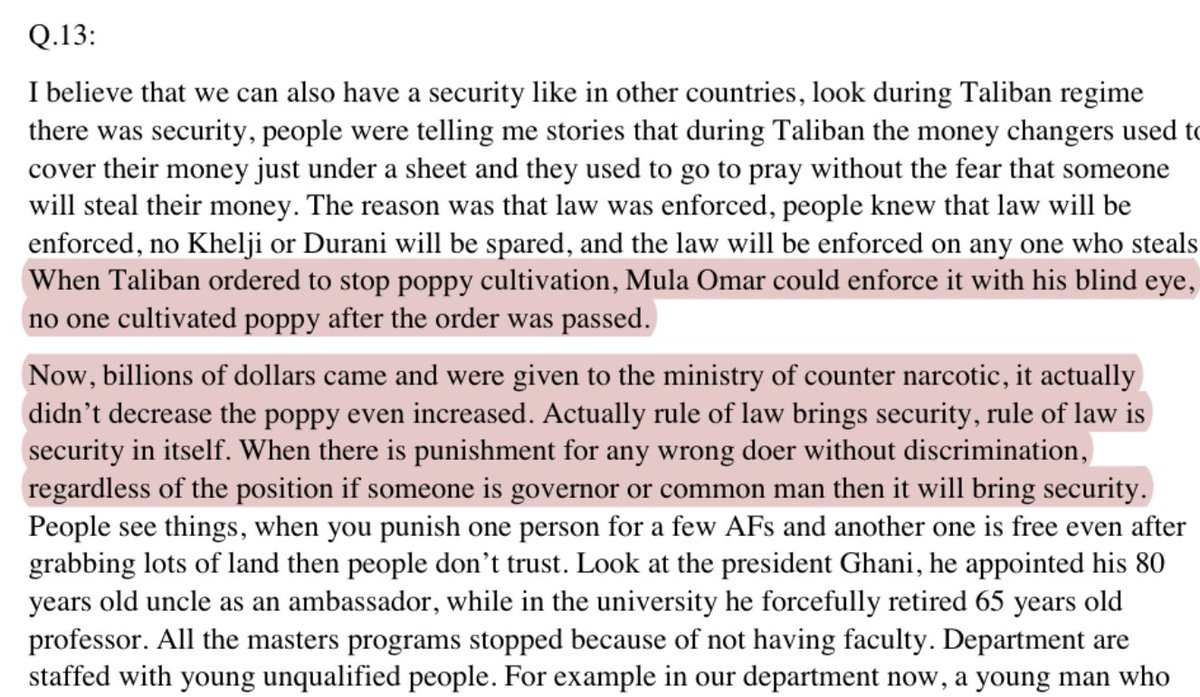
Many Afghans want to be left alone, believe that the King still rules in the capital. Afghans were insulted by a program on how to wash their hands. This is a former governor of Kandahar, not Helmand as I said above. 124/n 

Afghan army would try to get better armored Americans to go ahead of them and bear the brunt of any IEDs. 125/n washingtonpost.com/graphics/2019/… 

Former Afghan official Barna Karimi says that America has goals regarding what to achieve in Afghanistan in 30 or 50 years. Here he disagrees with American policymakers themselves, who mostly agree that the country had no discernible goals. 126/n 
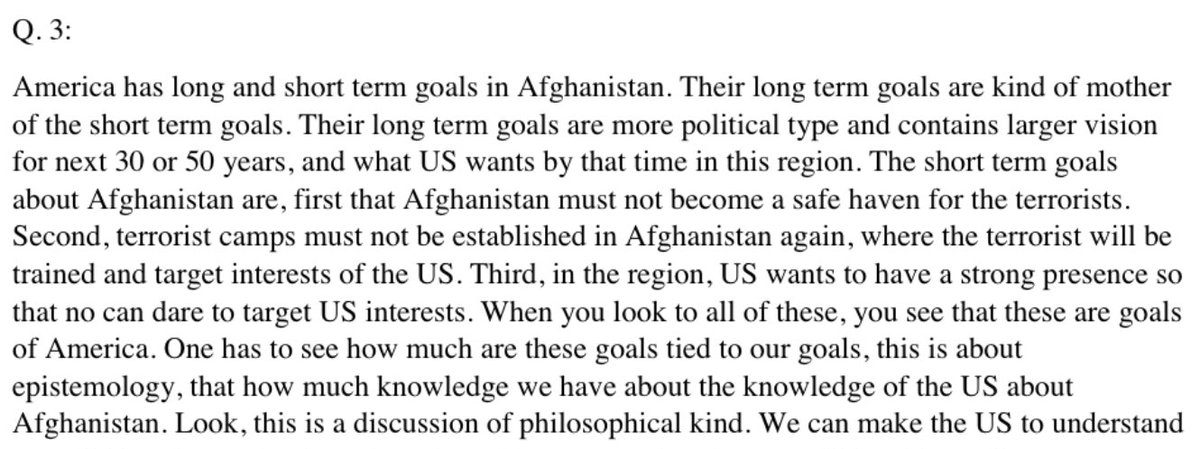
Taliban provides no services, but its strength is in the fact that it provides order, and can beat and torture people, and their judges aren't thieves. 127/n 
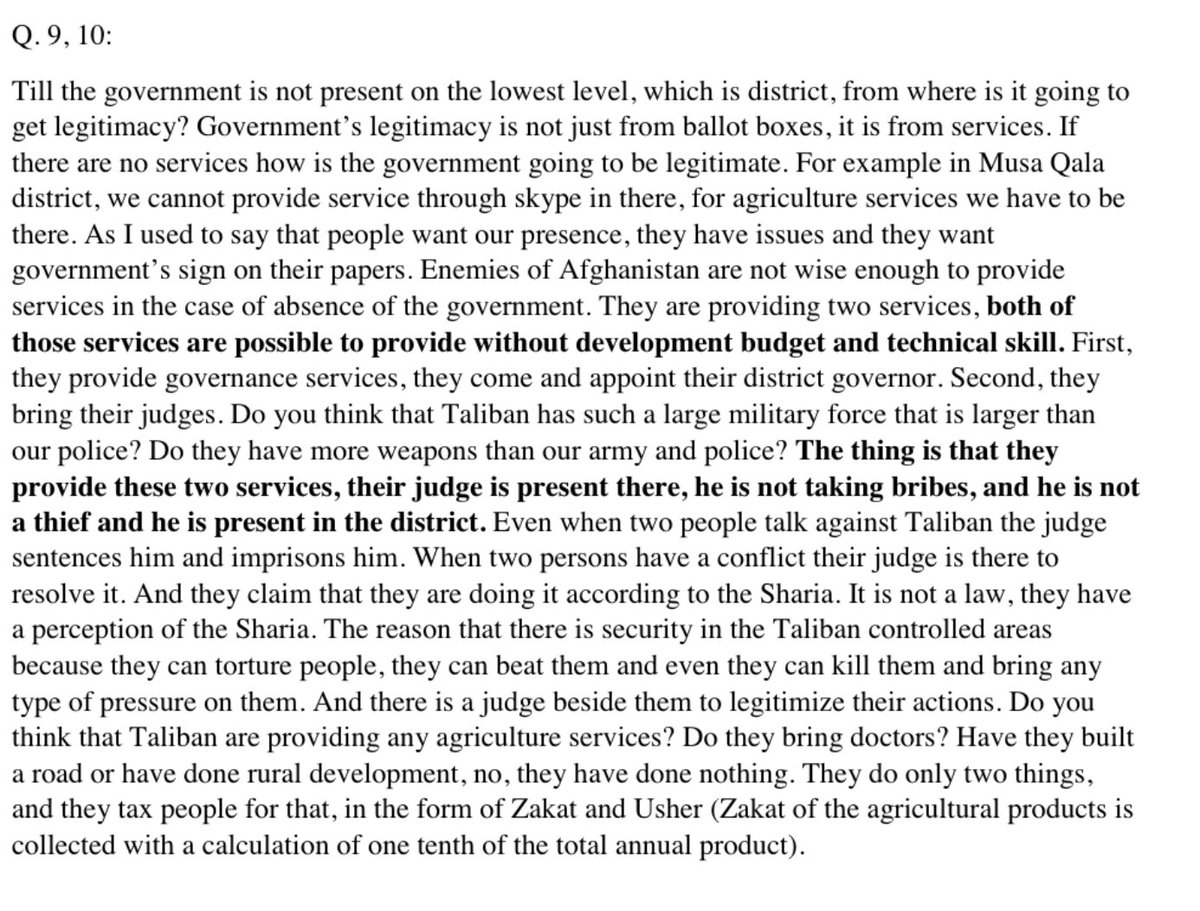
Afghan government official will not go to regions where the US can't provide safety. Will not tell his staff to go on roads where they will be kidnapped. Tells Americans to provide security and rule the area first, then the government will come. 128/n 
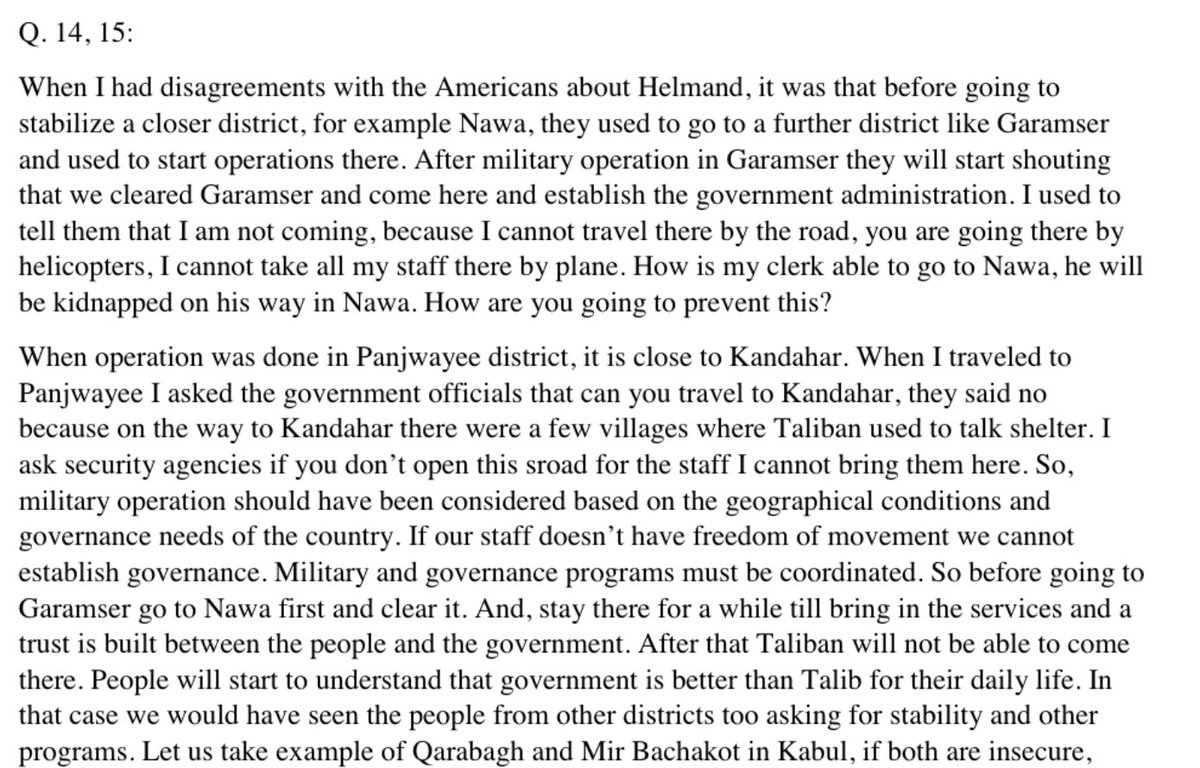
Unlike the private sector, in government there are no checks to make sure money is spent in a way that makes sense. "Security industry has taken over the government." 129/n 

"Warlords were only effective form of stability at the time but US were schizophrenic about it." Bad guys who the Americand did not know how to deal with. 130/n washingtonpost.com/graphics/2019/… 

When building a road, security conditions prevented the US from going out and seeing that it was actually built, so they counted it as finished. To build roads, you needed to pay insurgents protection money. 131/n washingtonpost.com/graphics/2019/… 

Professor John Garofano reports that the cost of building one mille of a certain highway might have been about two lives. 132/n 

Professor Garofano says that he read about groupthink across history, but was blown away by the degree to which you could predict everyone's opinions by bureaucratic interests. This is the sad things about the war, no grand strategy or purpose, just typical bureaucracy. 133/n 

Abdul Jabar Naimee, a current Afghan governor, complains about Afghan press reporting on the war, playing music, things that are contrary to Afghan values, at inappropriate times. 134/n 



A different Afghan governor says that laws won't be seen as legitimate by the people if not based in Shariah. 135/n washingtonpost.com/graphics/2019/… 

Richard Haas says no one was optimistic about achieving anything meaningful in Afghanistan at the beginning of the war. When Iraq was main conflict, they needed money for that, probably not an accident that when Iraq settled down we got really ambitious in Afghanistan. 136/n 

Afghan leaders sometimes say things that would be unthinkable for Americans. Tariq Esmati says that the Afghans were not ready for the kind of democracy Americans wanted. A lot of American officials question nation building, few directly express skepticism of democracy. 137/n 
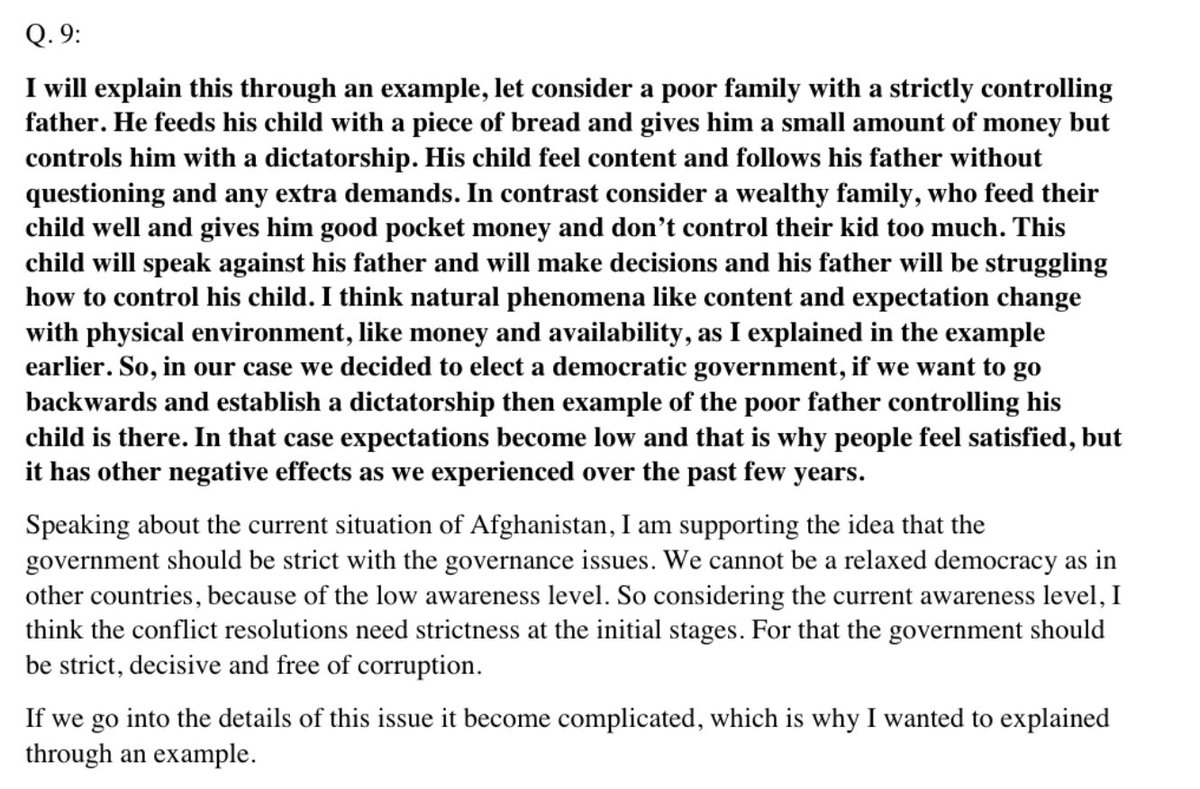
By deciding to build where there was more conflict, as hearts and minds theory says to do, the US incentivized violence. "districts that were relatively secure also became insecure in order to get some programs." 138/n 

"You make such big claims that you are going make Afghanistan like Singapore but in reality you cannot construct a building in a district." 139/n 

Yet another Afghan official saying religion needs to play a larger role in government. Seems that most Afghan leaders feel that they are better off under true believers. Has the piety of the Taliban been a reason that they are perceived as less corrupt? 141/n 

Taliban kidnapped a prosecutor, there now exit "pictures" that would prevent any future prosecutor from going after the Taliban. Unclear whether he lived through the experience. 142/n washingtonpost.com/graphics/2019/… 

When 9/11 happened, the US had no capabilities in Afghanistan because we closed our embassies there. The US is unique among major powers in refusing to have contact with governments it disapproves of. This norm has likely made it impossible to negotiate with the Taliban. 143/n 
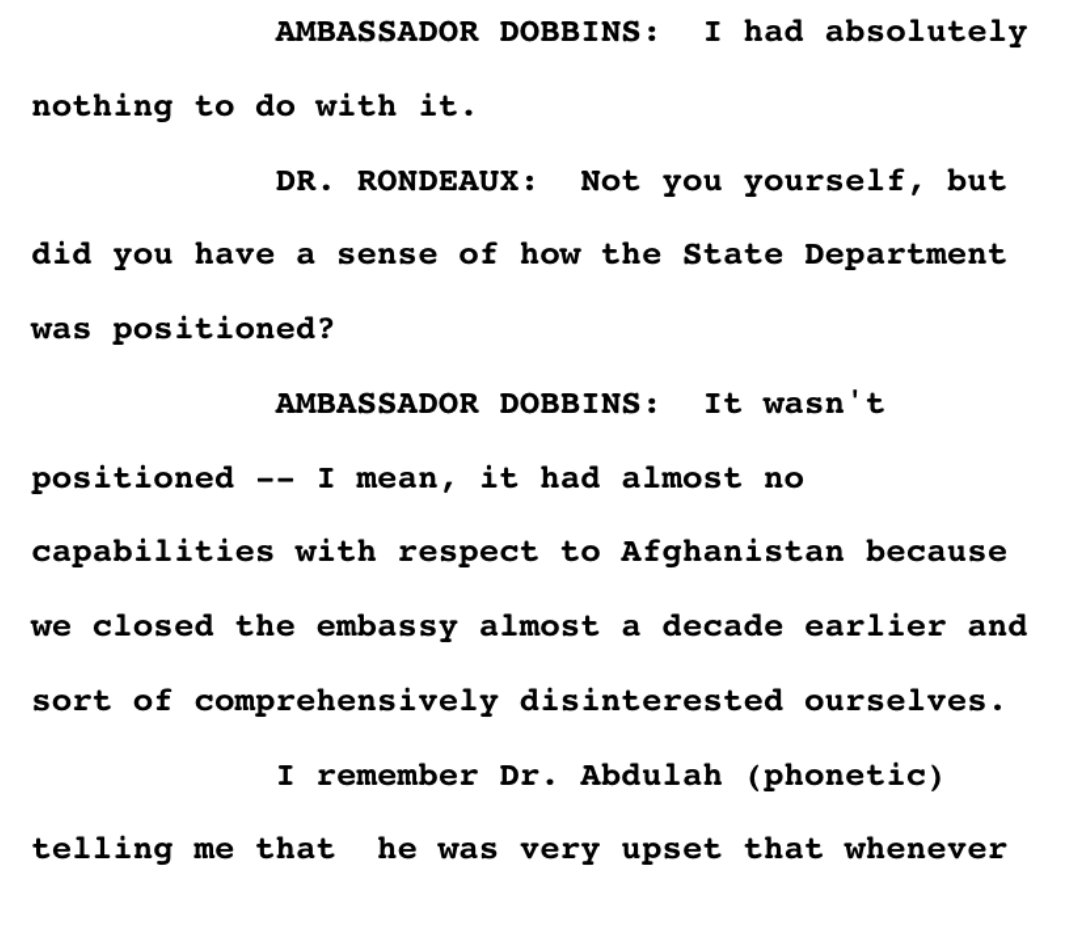
The US did not even consider inviting the Taliban to Bonn. By one account, Mullah Omar was ready to surrender at the time. 144/n 

Rondeaux suggests Karzai didn't want to talk to Taliban to protect his family interests, Dobbins says there was nothing in the intelligence to indicate he was corrupt. 145/n 

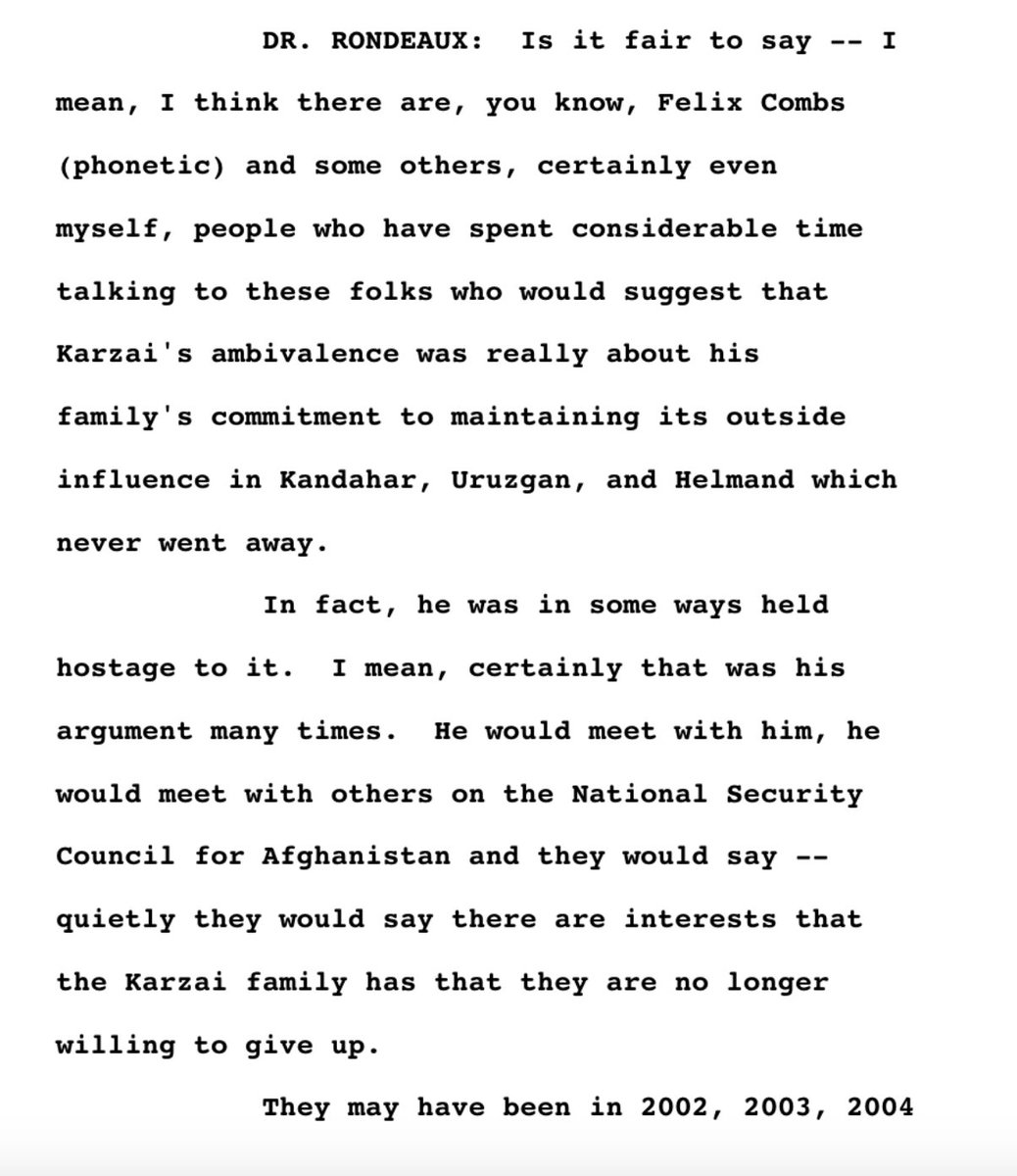

Dobbins says insurgents more likely to care that they're not getting cut of corruption than about the corruption itself. 146/n 

That's it for a while, will give people time to absorb what has been done so far. Thanks for everybody's feedback. Someone asked about donating to the effort. I'm not sure if many people are interested, but if anyone is you can DM me. 147/n.
I also encourage everyone to read the articles in the Washington Post, by @CraigMWhitlock, @lmshap, and @emamd. It is important to support good journalism, and the Post spent its own time and money to get these documents out there. 148/n
I see that this thread has gotten attention from both right and left with a lot of retweets from people with "resist" and "deplorable" in their names. Even if you dislike the media, know that good journalism is what makes this kind of information available. 149/n
Ryan Crocker responds to the Afghanistan documents. Says more girls are in school, so it's not all bad. Not only does this have nothing to do with the original justification for the war, it confirms that this is about ideology. 150/n washingtonpost.com/opinions/i-ser… 
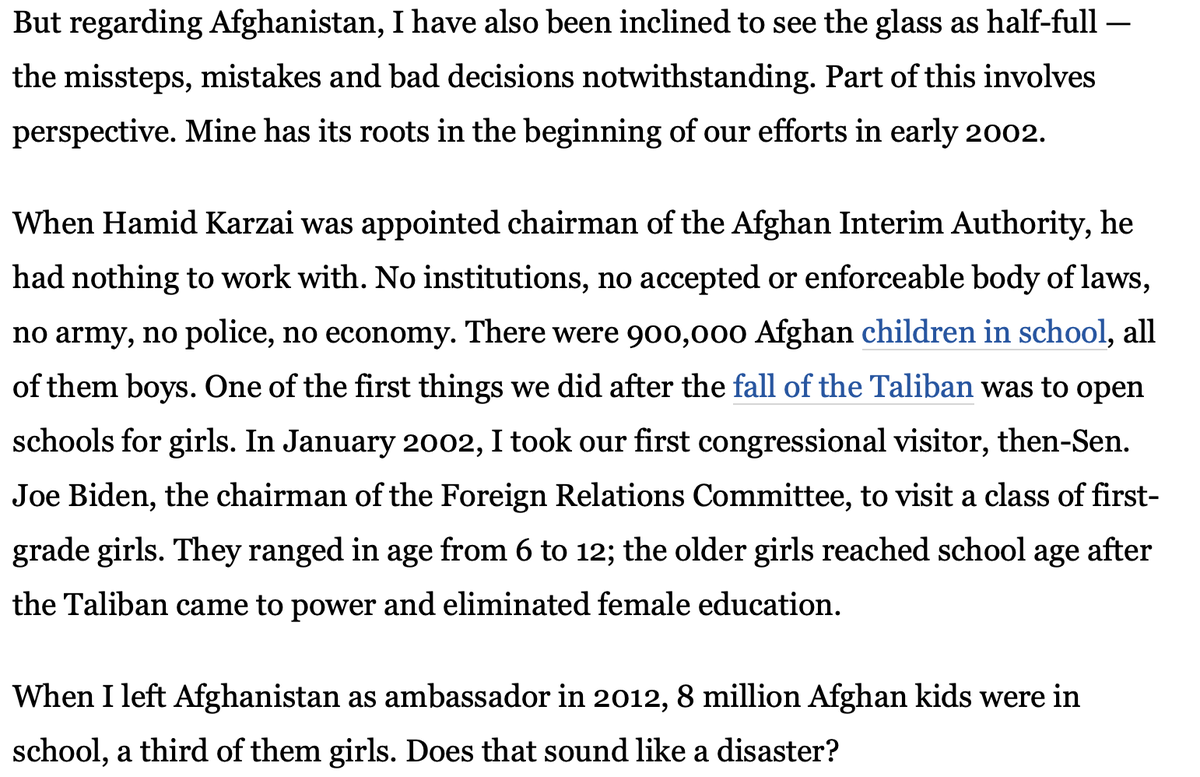
If the war is about American interests and security, it can end. If it's about getting the Afghans to accept liberal values, it can go on forever. In five years they still could be saying we can't leave while continuing to make progress on gender issues and minority rights. 151/n
Later in the article, Ambassador Crocker says "Let's be clear," the US is fighting for national security. Then why did he justify it a few paragraphs earlier by talking about how many girls are in school? Then ends the paragraph by again talking about female education. 152/n 
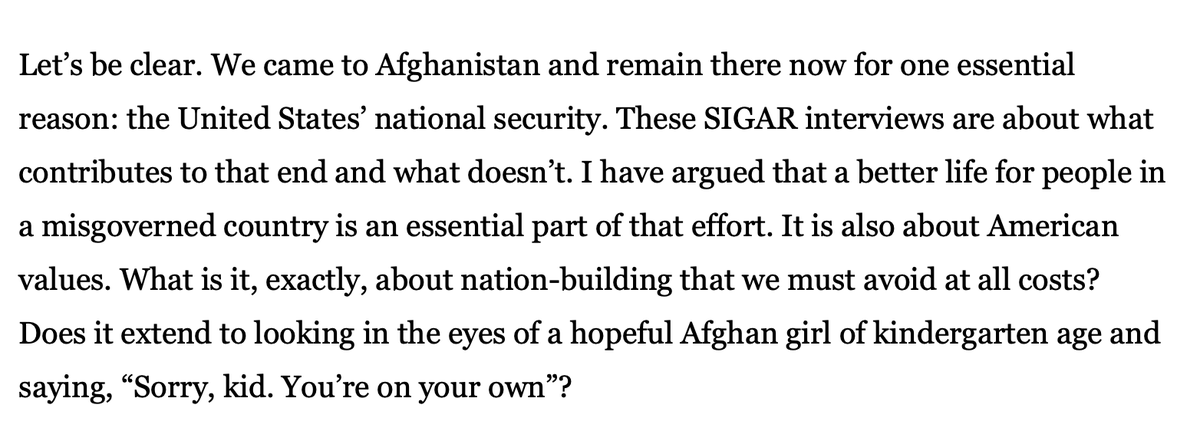
Interventionists want it both ways. When one justification fails, they switch to another one. If women were NOT going to school, he could say, how can we leave when women are not in school yet? If they are going to school, it turns into a reason for optimism. 153/n
"Heads I win, tails you lose." This op-ed is a clear demonstration of the mentality among our leaders that could keep us in Afghanistan forever. 154/n
In Steve Coll's book on Afghanistan, a Taliban representative asks whether America came to Taliban to free the women. It's a rhetorical question, but reading Ambassador Crocker's Washington Post op-ed, that is practically the only justification he provides for continuing. 155/n 


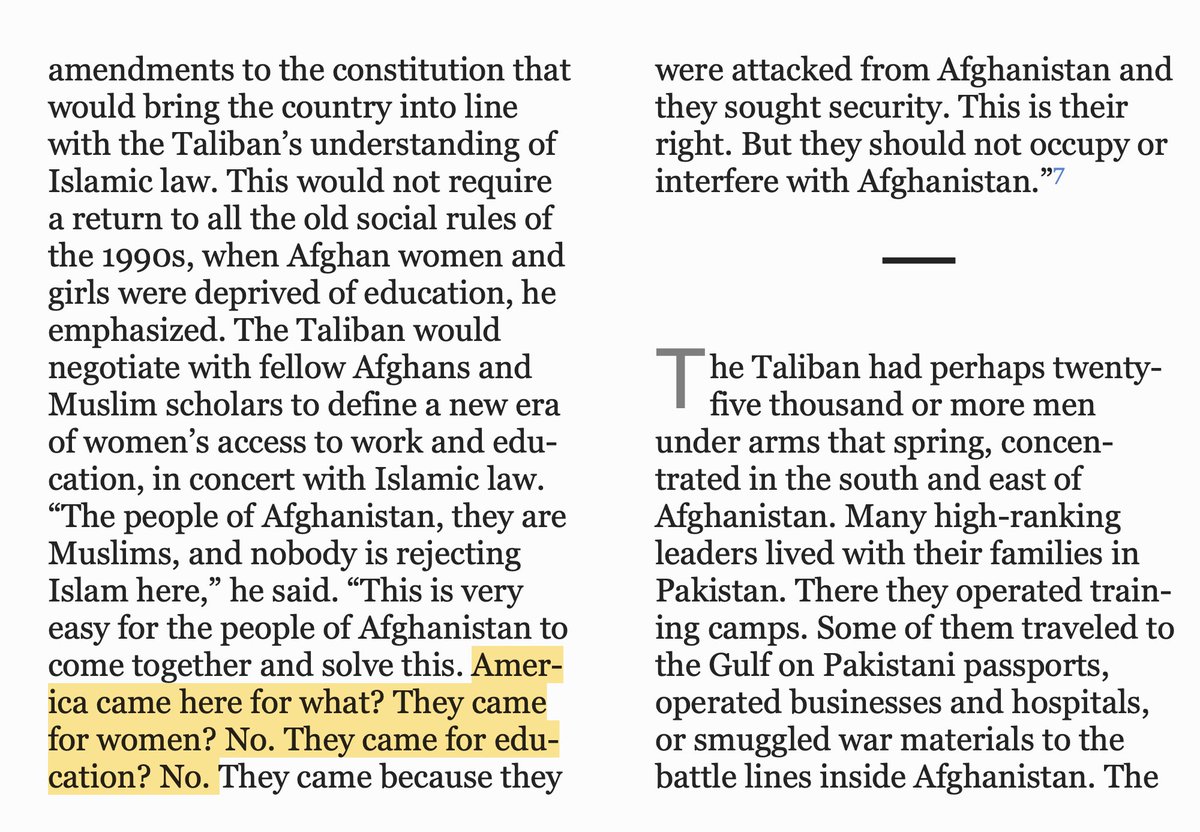
Important to note that it is not only American officials who accepted the logic of hearts and minds, or good governance model. Some Afghani officials bought into the concept too, although less often than Americans. Here is one example. 156/n washingtonpost.com/graphics/2019/… 


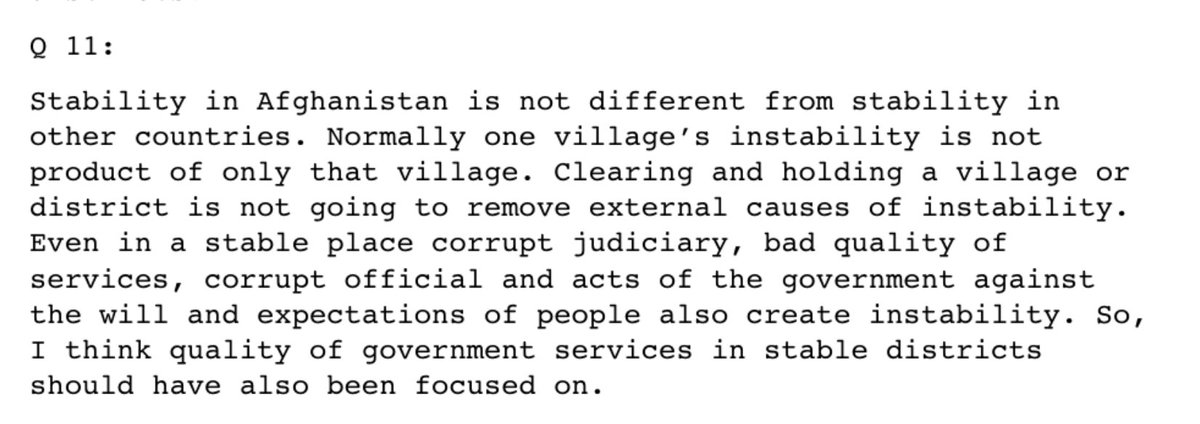


USAID had three mission directors in five years, no continuity in how the occupation was run. 157/n washingtonpost.com/graphics/2019/… 

US did not trust Afghans with the money, instead spending it through USAID. Could have led to corruption, but considering the widespread agreement that there was massive corruption anyway, wouldn't the Afghans been in best position to prioritize where money should go? 158/n 


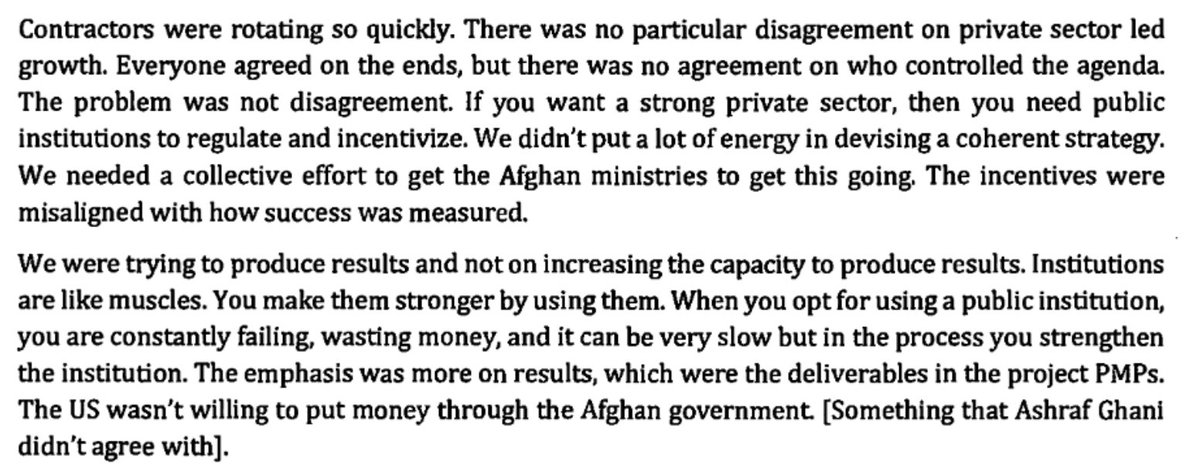
Another Afghan official says justice system has to come first and the Taliban does it better than the government. 159/n washingtonpost.com/graphics/2019/… 


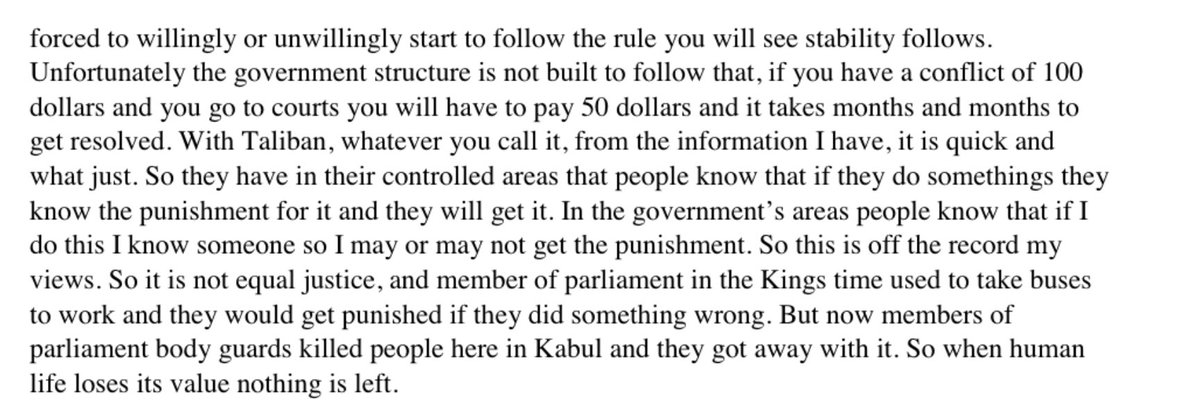
Afghan official says you could have given every Afghan $100K for cost of war. Doing some quick math, US spent about $2 trillion, Afghan population in 2001 was 21 million, so that's about right ($95,238). We shouldn't lose sight of the cataclysmic nature of the failure here. 160/n 

During the time of the Russians, officials working on development could go anywhere and not be attacked. Now everyone working on development is seen as part of the western project. 161/n 

US once empowered a Pashtun police force, they set up checkpoints and started shaking down Hazaras. 162/n washingtonpost.com/graphics/2019/… 

Afghans are more tolerant of deaths caused by the Taliban because since the Taliban is religious, they must be good. 163/n 



In 2015, Candace Rondeaux says she's conducting the interview to get recommendations for Syria, as "we are assuming that is the next engagement." 164/n washingtonpost.com/graphics/2019/… 


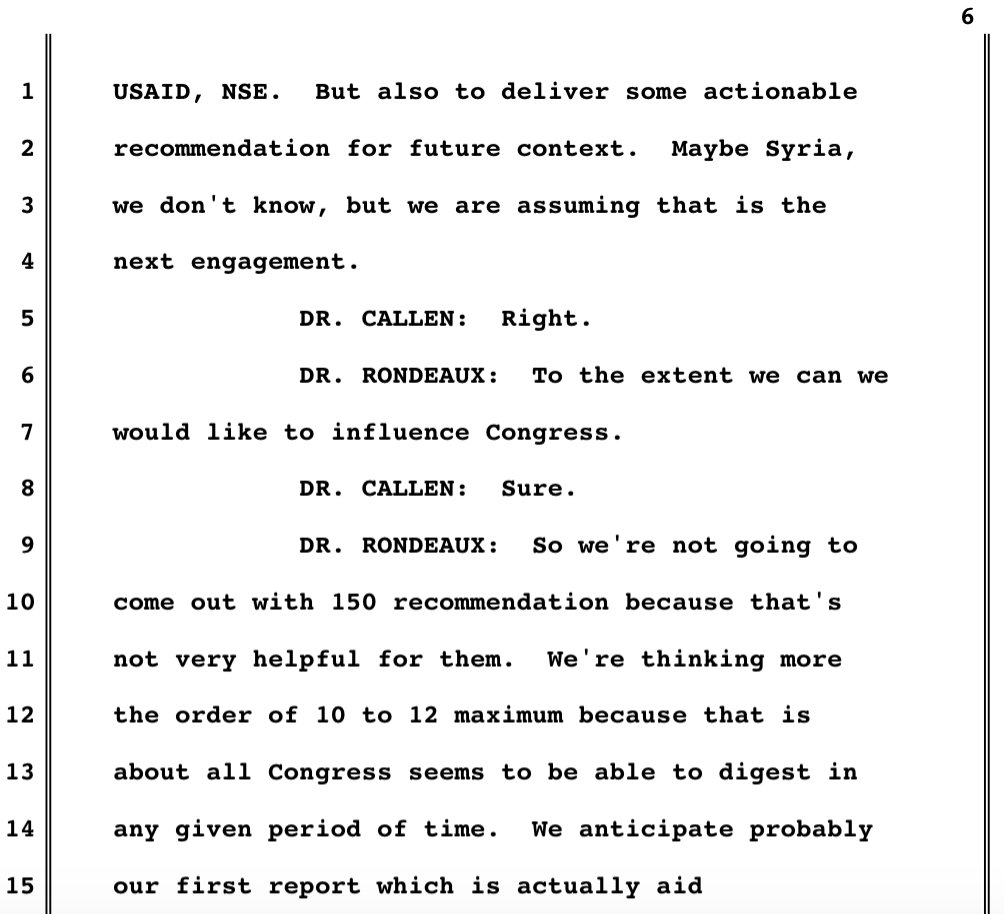
Somebody tried to do randomized control trials to see what works when providing assistance. Contractors became shrill and demanded that be taken out of their contracts. 165/n 


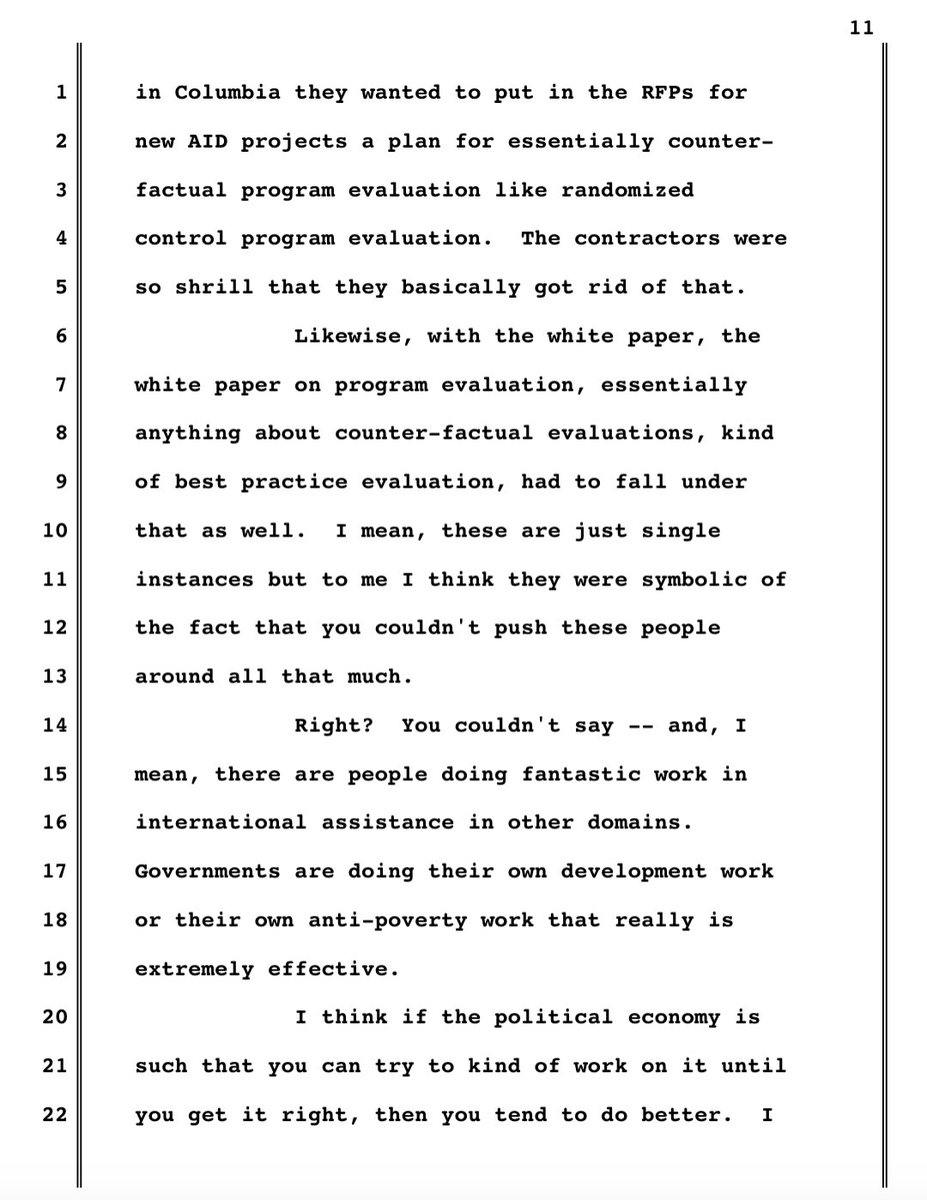
The design of the constitution was made to placate the National Alliance, so everyone could get a ministry. 166/n 



US wanted a "progressive constitution," so it gave religious leaders "nice packages" to endorse women's rights. It would then pay the parliament to vote the right way, including female delegates. Afghan politicians would talk and soon they'd all want to be paid. 167/n 

US would condition aid on ensuring that their were certain facilities that Afghan men could not go into and jobs that were only available to women. 168/n 
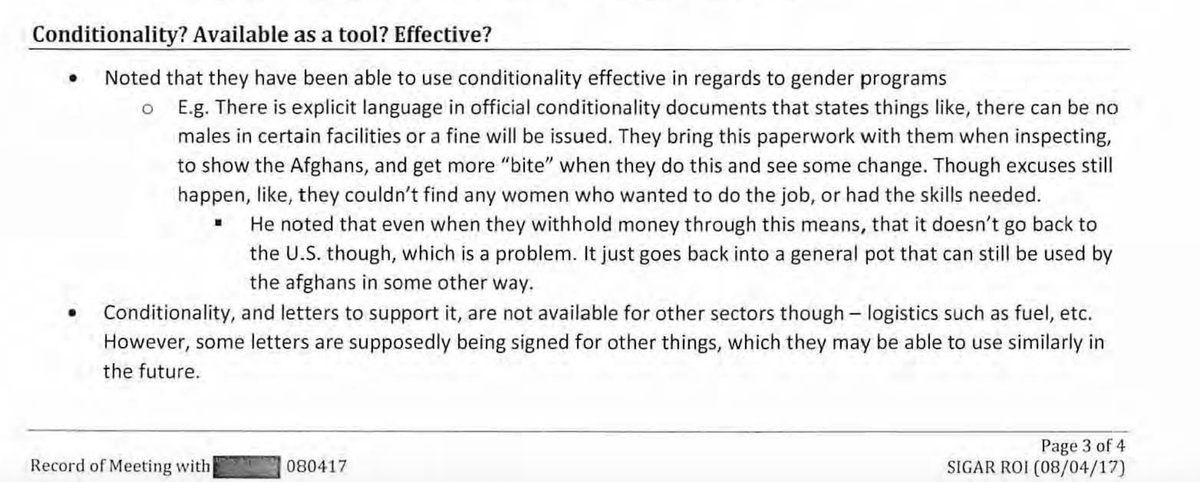
Zalmay Khalilzad says that Iraqis thought that the US came to their country because it was punishing Muslims after 9/11, as they were projecting their own mentality on to us. We did in fact invade Iraq in response to 9/11, so doesn't seem that crazy. 169/n washingtonpost.com/graphics/2019/… 
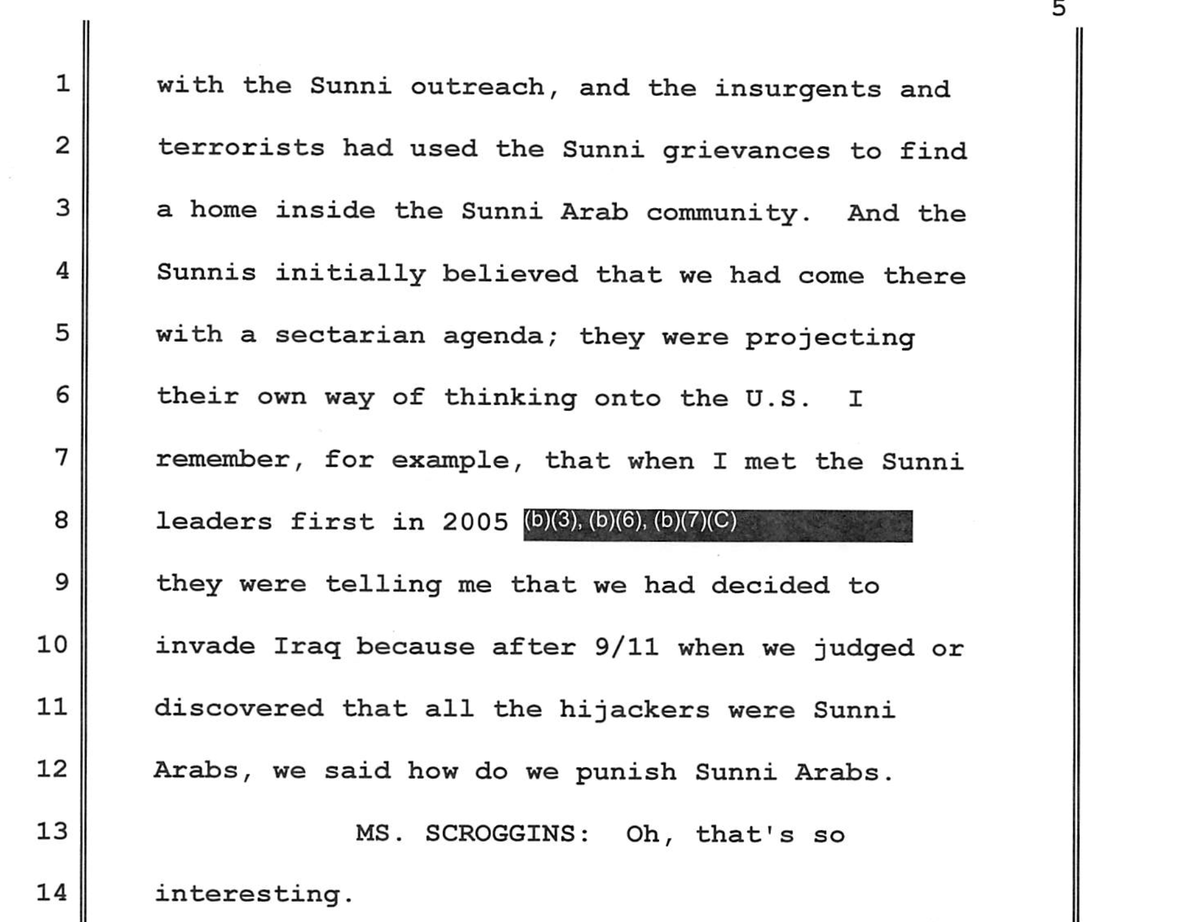
Says that the Sunnis thought that the US was giving power to the Shia to punish the Sunnis on America's behalf. The most absurd thing about this is that it assumes the Bush administration could tell Sunnis and Shia apart. 170/n 

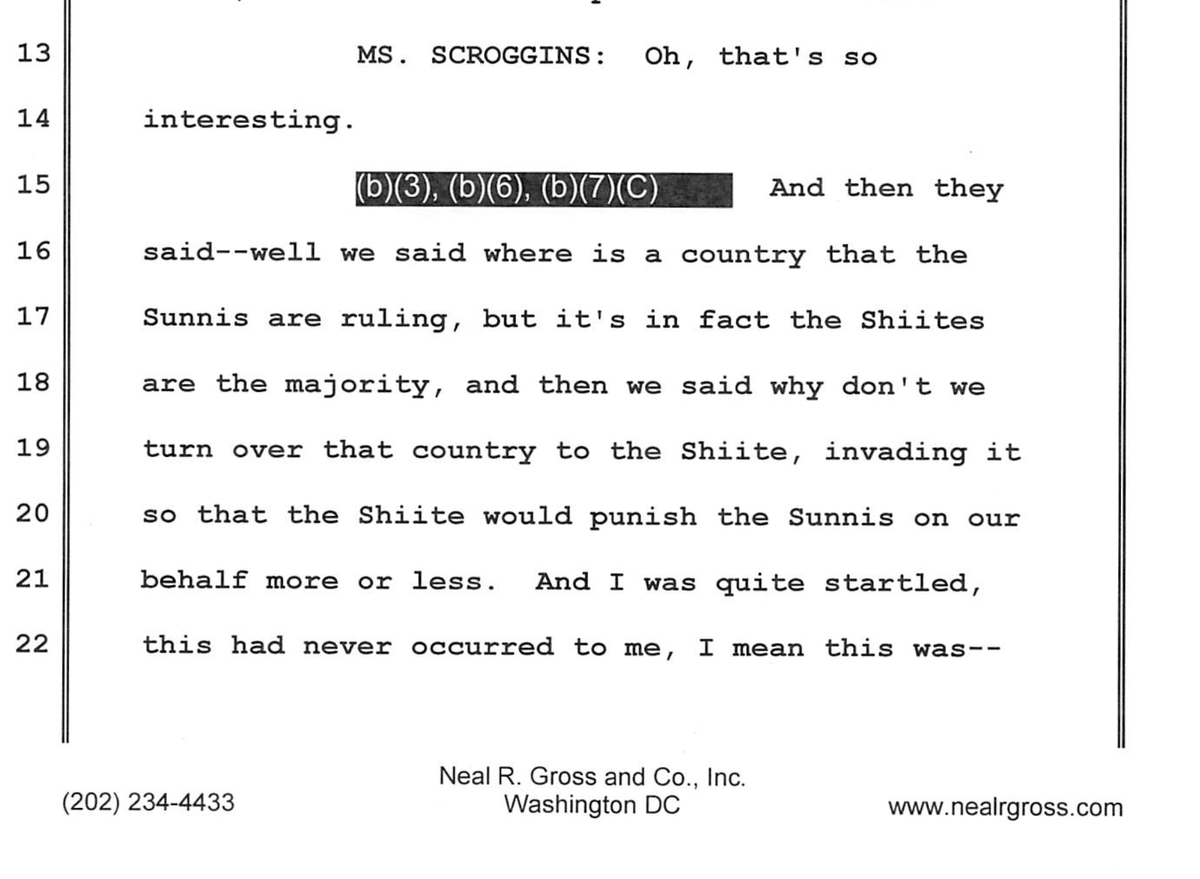

More on the bizarre crusade to get Afghans to eat soy. Afghans did not want it in their bread. 171/n 

US tried to bring playgrounds to Afghanistan, which the locals did not consider a priority, asked for roads and irrigation canals first. 172/n washingtonpost.com/graphics/2019/… 


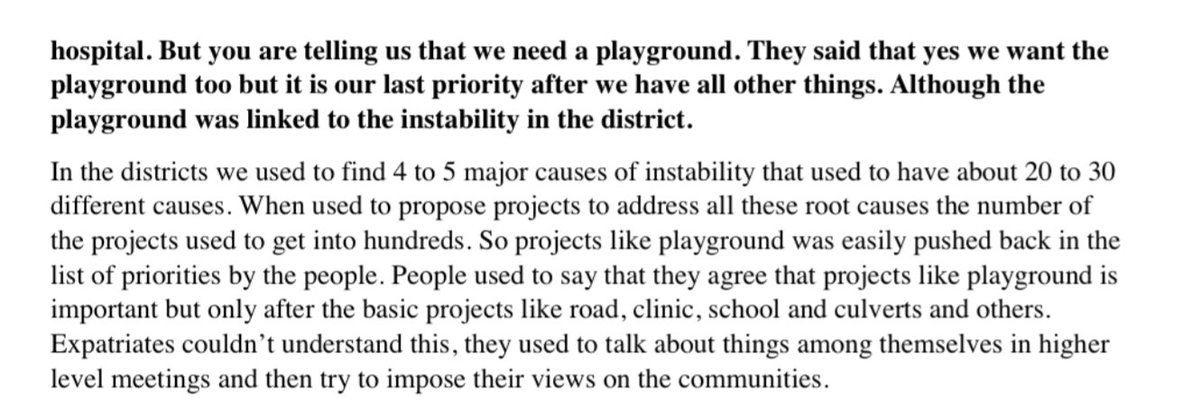
"People have hundreds of problems, so if you solve five for them they still think that you have done nothing." 173/n 

More on security under the Taliban, you could travel around with gold wherever you wanted, but there was "no progress and no development." 174/n 

Barnett Rubin says we cannot just do security and justice like the Taliban does because we are not the Taliban, we do things differently. 175/n washingtonpost.com/graphics/2019/… 

American official says that 2009-2014, there were 147,360 reports written, 5,000 a month. They had 663 Afghan contractors doing this, 22 American contractors, still only spent a third of money. This was clearly make-work, no institution can process all that information. 176/n 

One team thought it wasn't allowed to fund a Tae Kwan Do studio, although others funded boxing studios. 177/n washingtonpost.com/graphics/2019/… 

Unusually sharp analysis from an anonymous official. 178/n washingtonpost.com/graphics/2019/… 
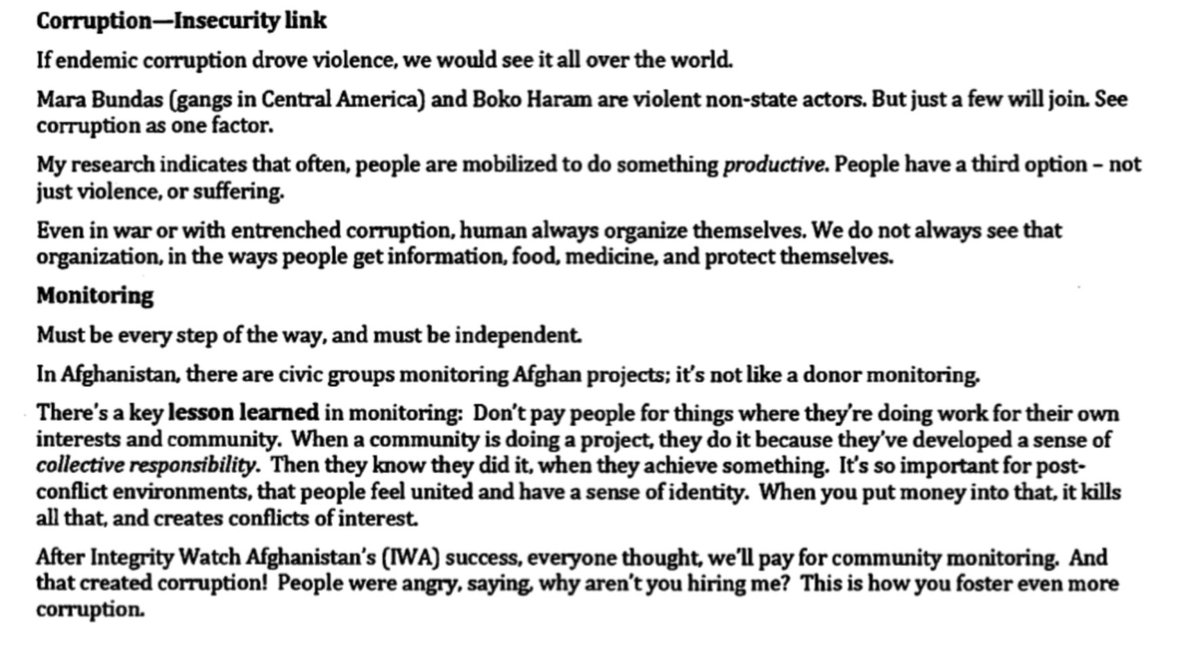
Afghan contractors tried to spend money as quickly as possible, as that was the only way to get more contracts. They cared nothing about quality but were measured by their numbers, so they would build schools and clinics that fell apart quickly. 179/n washingtonpost.com/graphics/2019/… 

NSC should have done interagency coordination, but "we were just too far away." State & Embassy were on one side of road and USAID on the other, connected by a tunnel that nobody wanted to cross for some unexplained reason. Govt incentive structure unchanged since Vietnam. 180/n 


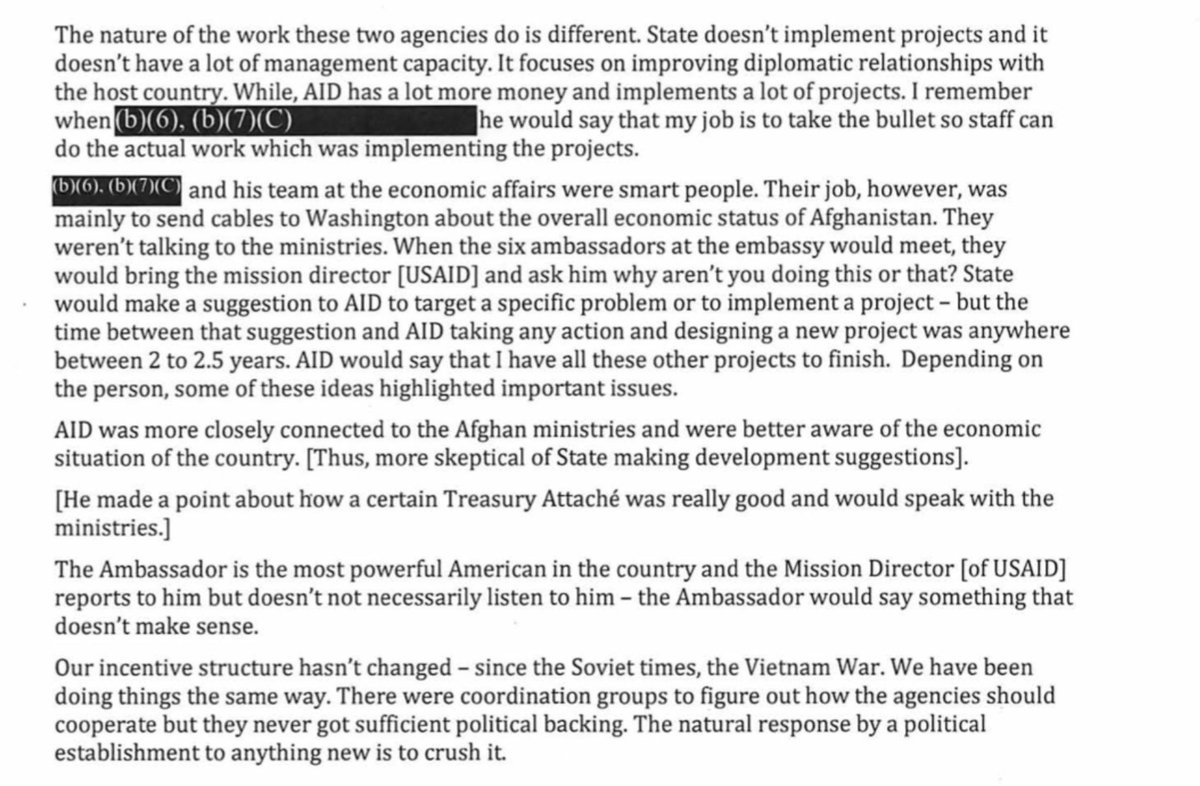
Advisor to Afghan forces, responds to the story by saying that we never took on corruption, which hurt "legitimacy...in the eyes of the Afghan people." Unmeasurable metrics are very convenient for those who want forever war. 181/n washingtonpost.com/outlook/2019/1… 

Karzai aide accepted bribe to shut down probe into contractor funding insurgents. When US went after him, Karzai told law enforcement to stop cooperating with US. Given establishment dedication to forever war, Afghans know they can get away with anything. 182/n 

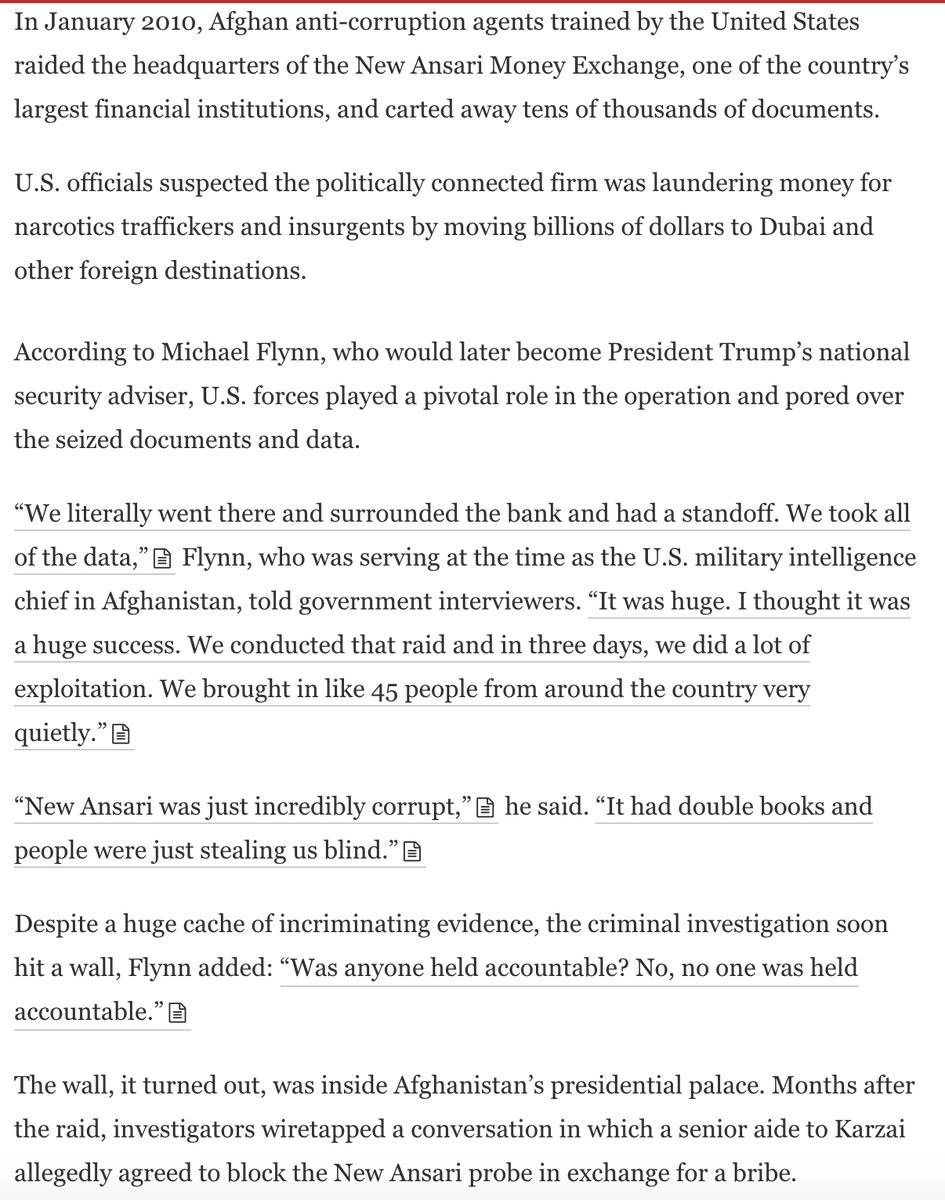
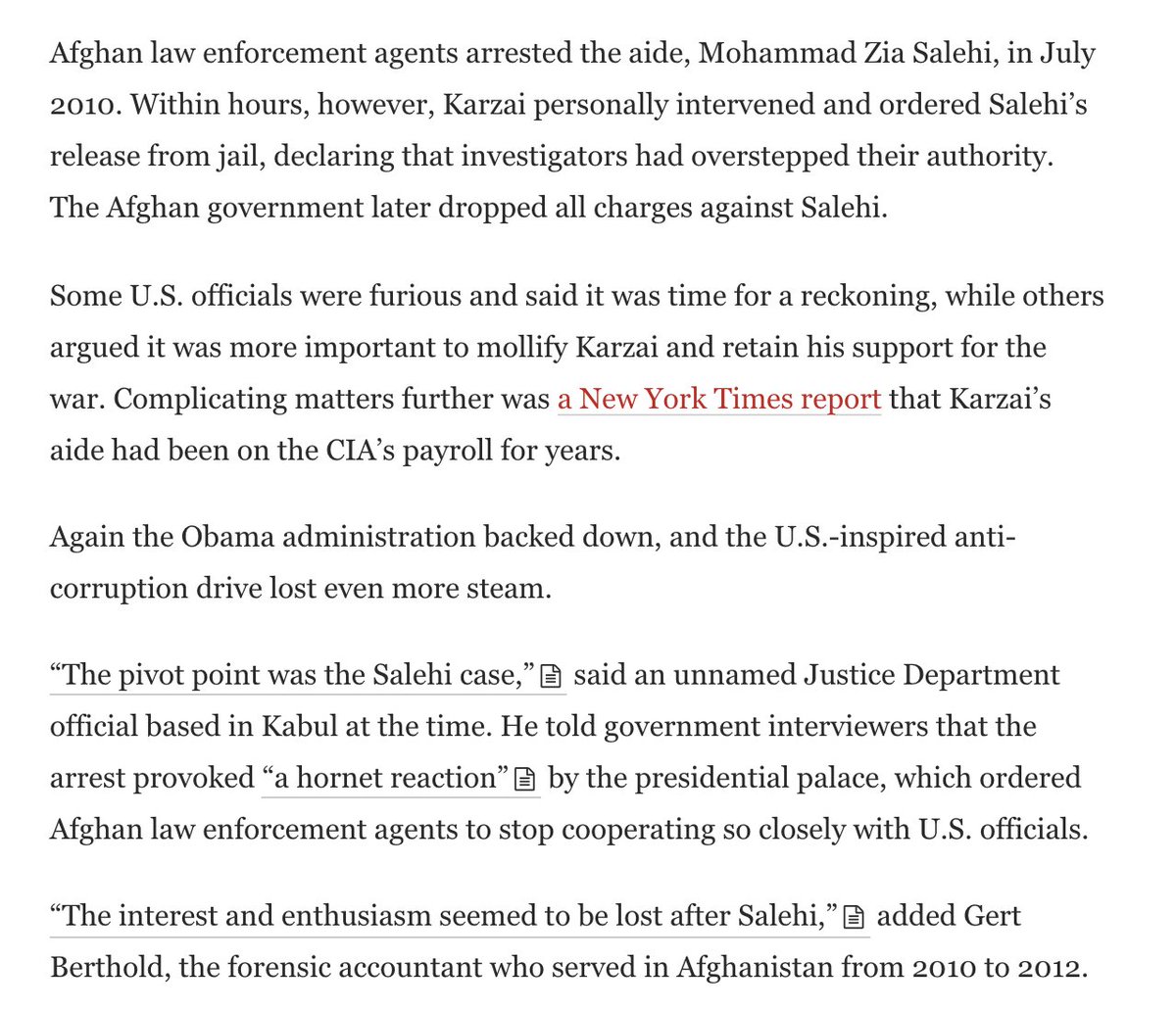
Army Civil Affairs officer says US gave out "mosque refurbishment kits," that the Afghans prioritized mosques over food or sanitation. 183/n washingtonpost.com/graphics/2019/… 

US asked tribes on the Afghan-Pakistan border what denomination of money they used to test their allegiances (?). Says the tribes didn't recognize or care about the border, because they are all Pashtuns. The US gave them a questionnaire. 184/n 



One person would be in charge of $30 million to $50 million a year, and just had to find a way to spend it. 185/n 
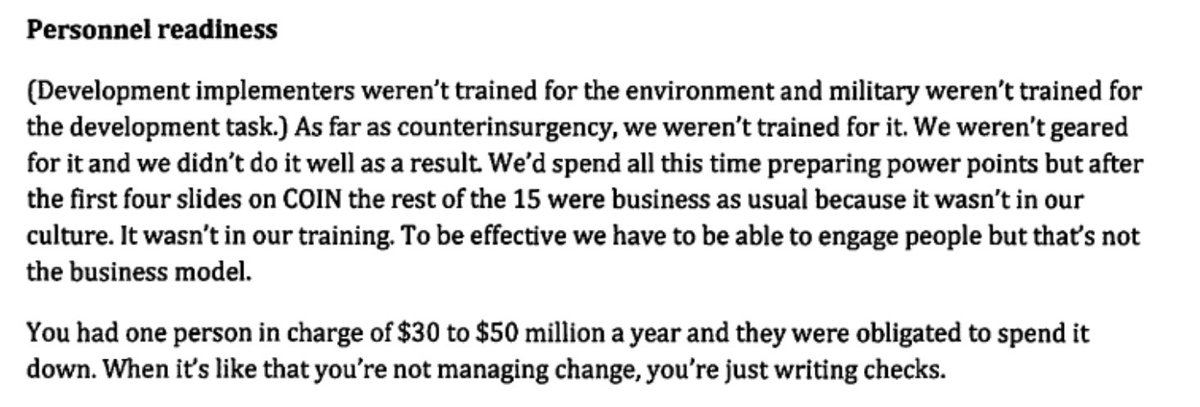
US would give Afghans a radio station kit, then a staff sergeant would show up and say here's $10,000 for a radio station. US kept building schools without books or salaries for teachers. 186/n washingtonpost.com/graphics/2019/… 
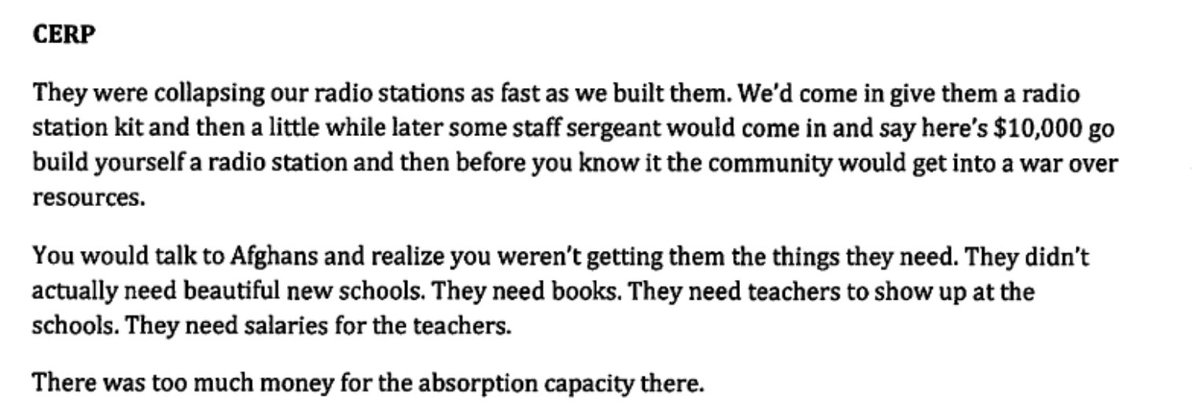
• • •
Missing some Tweet in this thread? You can try to
force a refresh


